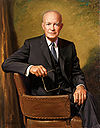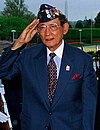

The United States Military Academy (USMA) is an undergraduate college in West Point, New York with the mission of educating and commissioning officers for the United States Army. The academy was founded in 1802 and is the oldest of the United States' five service academies. It is also referred to as West Point (the name of the military base that the academy is a part of). The academy graduated its first cadet, Joseph Gardner Swift, in October 1802. Sports media refer to the academy as "Army" and the students as "Cadets"; this usage is officially endorsed. The football team is also known as "The Black Knights of the Hudson" and "The Black Knights". A small number of graduates each year choose the option of cross-commissioning into the United States Air Force, United States Navy, or the United States Marine Corps. Before the founding of the United States Air Force Academy in 1955, the academy was a major source of officers for the Air Force and its predecessors. Most cadets are admitted through the congressional appointment system. The curriculum emphasizes the sciences and engineering fields.
The list is drawn from graduates, non-graduate former cadets, current cadets, and faculty of the Military Academy. Notable graduates include 2 American Presidents, 4 additional heads of state, 20 astronauts, 76 Medal of Honor recipients (more than any other service academy or undergraduate institution), 70 Rhodes Scholars, and 3 Heisman Trophy winners. Among American universities, the academy is fourth on the list of total winners for Rhodes Scholarships, seventh for Marshall Scholarships and fourth on the list of Hertz Fellowships.
This is a dynamic list and may never be able to satisfy particular standards for completeness. You can help by adding missing items with reliable sources.Academicians
- "Class year" refers to the alumni's class year, which usually is the same year they graduated. However, in times of war, classes often graduate early. For example, there were two classes in 1943 – January 1943 and June 1943.
Academics
- Note: "Class year" refers to the alumni's class year, which usually is the same year they graduated. However, in times of war, classes often graduate early.
|
       |
Superintendents of the United States Military Academy
Main article: Superintendent of the United States Military Academy
|
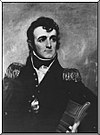   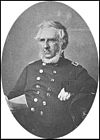 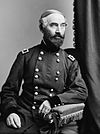 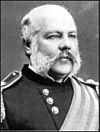 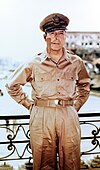 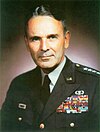  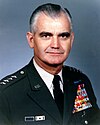    |
Commandants of the United States Military Academy
Main article: List of commandants of cadets of the United States Military Academy
|
       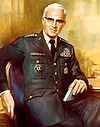 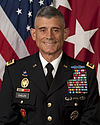 |
Top-ranking graduates
Main article: List of United States Military Academy top-ranking graduatesAstronauts
Main article: List of astronauts trained at the United States Military Academy- Note: "Class year" refers to the alumni's class year, which usually is the same year they graduated. However, in times of war, classes often graduate early.
|
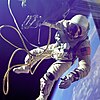   |
Authors
This is a dynamic list and may never be able to satisfy particular standards for completeness. You can help by adding missing items with reliable sources.This a new list that requires significant work to be remotely complete. New, accurate, contributions are welcome and needed.
|
Businesspeople
- Henry A. du Pont, class of 1861, President and general manager of Wilmington & Western Railroad (1879–1899)
- Robert E. Wood, class of 1900, chairman and CEO of Sears, Roebuck (1939–1954); responsible for shifting the company's focus from a mail-order catalog company to a department store retailer; started AllState Insurance as a subsidiary of Sears; served as the Quartermaster of the Army in World War I and as chief quartermaster during the construction of the Panama Canal
- William T. Seawell, class of 1941, chairman and CEO of Pan Am Airways (1971–1981)
- Robert F. McDermott, class of 1943, former chairman and CEO of United Services Automobile Association (USAA)
- John F. Donahue, class of 1946, founder and Chairman of Federated Investors ($400 billion asset management firm)
- Frank Borman, class of 1950, President of Eastern Airlines (1975–1986)
- Walter F. Ulmer, class of 1952, President and CEO of Center for Creative Leadership (1985–1994)
- Rand Araskog, class of 1953, President, chairman, and CEO of ITT Communications
- Dana G. Mead, class of 1957, chairman and CEO of Tenneco (1994–1999), Chairman of MIT Corporation (since 2003)
- Pete Dawkins, class of 1959, former chairman and CEO of Primerica Financial Services, Vice-chairman and EVP of Travelers Insurance, Vice Chairman of Bain and Company, Vice Chairman of Citi Global Wealth Management, currently Senior Partner at Flintlock Capital
- Fred Malek, class of 1959, founder and Chairman of Thayer Capital Partners, Chairman of Northwest Airlines
- Frank J. Caufield, co-founder of venture capital firm Kleiner Perkins Caufield & Byers
- Albert Dunlap, class of 1960, CEO of Scott Paper and Sunbeam
- Jim Kimsey, class of 1962, chairman and co-founder of AOL
- Daniel W. Christman, class of 1965, Superintendent of USMA, 1996–2001; Chairman of Ultralife Corporation, SVP of International Affairs for US Chamber of Commerce (since 2003)
- John B. Ritch III, class of 1965, chairman and co-founder of Calivita International (since 1992)
- William P. Foley II, class of 1967, former CEO and current Chairman of Fidelity National Information Services
- Marshall Larsen, class of 1970, chairman and CEO of Goodrich, Corporation (since 2003)
- Bob McDonald, class of 1975, CEO of Procter & Gamble
- Ken Hicks, class of 1974, President and CEO of Foot Locker, former President of JCPenney
- William Albrecht, class of 1974, President of Occidental Oil and Gas
- Vincent Viola, class of 1977, former Chairman of NYMEX (2001–2004), CEO of VirtuFinancial, owner and member of Chairman's Council of the New Jersey Nets
- Keith McLoughlin, class of 1978, President and CEO of Electrolux
- Alex Gorsky, class of 1982, CEO of Johnson & Johnson
- Mark Green, class of 1986, founder and former CEO of Align MD
- Anthony J. Guzzi, class of 1986, President and CEO of EMCOR Group, Inc., the world's largest specialty construction, facilities services, energy infrastructure provider and a Fortune 500 company
- David McCormick, class of 1987, CEO of Bridgewater Associates, one of the world's largest hedge funds, from 2020 to 2022. Named president of FreeMarkets in 2001 and was named chief executive officer in 2002; he successfully sold FreeMarkets to Ariba in 2004 for approximately $500 million.
- Mark Clouse, class of 1990, President and CEO of Campbell Soup Company
- Anthony Noto, class of 1991, former CFO and COO of Twitter and current CEO of SoFi
- John Ham, class of 2000, Ustream Founder, CEO and Chairman
- Brad Hunstable, class of 2001, founder and President of Ustream.TV
Engineers
Main article: List of engineers trained at the United States Military Academy
|
 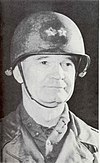 |
Government
Heads of state or government
Directors of the Central Intelligence Agency
- Hoyt Vandenberg, class of 1923, DCI 10 June 1946 – 1 May 1947
- David Petraeus, class of 1974, DCIA 6 September 2011 – 9 November 2012
- Mike Pompeo, class of 1986, DCIA 23 January 2017 – 26 April 2018 (became United States Secretary of State)
Cabinet members
- Andrew J. Donelson, class of 1820, President's Secretary (1829–1837)
- Jefferson Davis, class of 1828, United States Secretary of War (1853–1857)
- Montgomery Blair, class of 1835, United States Postmaster General (1861–1864)
- William Tecumseh Sherman, class of 1840, United States Secretary of War (1869)
- Gustavus Woodson Smith, class of 1842, Confederate States Secretary of War (1862)
- John Schofield, class of 1853, United States Secretary of War (1868–1869)
- Marshall Carter, class of 1931, Deputy Director of Central Intelligence (1962–1965) and Director of the National Security Agency (1965–1969)
- Rafael M. Ileto, class of 1943, Philippine Secretary of National Defense (1986–1988)
- Brent Scowcroft, class of 1947, National Security Advisor (1974–1977, 1989–1993)
- Alexander Haig, class of 1947, United States Secretary of State (1981–1982)
- Fidel V. Ramos, class of 1950, Philippines Secretary of National Defense (1988–1991)
- John Block, class of 1957, United States Secretary of Agriculture (1981–1986)
- Jim Nicholson, class of 1961, United States Secretary of Veterans Affairs (2005–2007)
- Barry McCaffrey, class of 1964, US Drug Czar (1996–2001)
- Eric K. Shinseki, class of 1965, United States Secretary of Veterans Affairs (2009–2014)
- James Peake, class of 1966, United States Secretary of Veterans Affairs (2007–2009)
- Robert Alan McDonald, class of 1975, United States Secretary of Veterans Affairs (2014–2017)
- Mike Pompeo, class of 1986, United States Secretary of State (2018–2021), former Director of the Central Intelligence Agency (2017–2018)
- Mark Esper, class of 1986, 27th United States Secretary of Defense (2019–2020), former 23rd United States Secretary of the Army (2017–2019)
- Lloyd Austin, class of 1975, 28th United States Secretary of Defense (2021–present)
Secretaries of the Army
- Howard Hollis Callaway, class of 1949, 11th United States Secretary of the Army (1973-1975)
- Louis Caldera, class of 1978, 17th United States Secretary of the Army (1998-2001)
- Thomas E. White, class of 1967, 18th United States Secretary of the Army (2001-2004)
- Mark Esper, class of 1986, 23rd United States Secretary of the Army (2017–2019)
Ambassadors
|
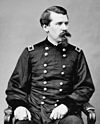 |
- Andrew J. Donelson, class of 1820, Chargé d'affaires of the United States to the Republic of Texas (1845), U.S. Minister to Prussia (1846–49), U.S. vice presidential candidate (1856)
- Rufus King, class of 1833, U.S. Minister to the Papal States (1863–1867)
- William Woods Averell, class of 1855, U.S. Consul General to British North America (1866–1869)
- Hugh Judson Kilpatrick, class of 1856, U.S. Minister to Chile, 1866–70, 1881
- Frederick Dent Grant, class of 1871, U.S. Minister to Austro-Hungarian Empire (1890–1893)
- James Maurice Gavin, class of 1929, U.S. Ambassador to France (1961–62)
- John Eisenhower, class of 1944, U.S. Ambassador to Belgium (1969–1971)
- David Manker Abshire, class of 1951, U.S. Ambassador to NATO (1983–1987)
- John Galvin, class of 1954, U.S. Ambassador to Bosnian Peace Negotiations
- Jim Nicholson, class of 1961, U.S. Ambassador to the Vatican (2001–2005)
- John B. Ritch III, class of 1965, U.S. Ambassador to United Nations International Organizations in Vienna (1993–2001)
- Robert M. Kimmitt, class of 1969, U.S. Ambassador to Germany (1991–1993)
- William B. Taylor Jr., class of 1969, U.S. Ambassador to Ukraine (2006–2009, 2019–2020)
- Karl Eikenberry, class of 1973, U.S. Ambassador to Afghanistan (2009–2011)
- Matthew Klimow, class of 1974, U.S. Ambassador to Turkmenistan (2019–present), acting State Department Inspector General (2020)
Governors (civil)
|
  |
- Robert Francis Withers Allston, class of 1821, Governor of South Carolina (1856–58)
- David Wallace, class of 1821, Governor of Indiana (1837–1840)
- Robert Milligan McLane, class of 1837, Governor of Maryland (1884–85)
- Isaac Ingalls Stevens, class of 1839, Governor of Washington Territory (1853–1857)
- George Stoneman, class of 1846, Governor of California (1883–1887)
- George B. McClellan, class of 1846, Governor of New Jersey (1878–81)
- Ambrose Burnside, class of 1847, Governor of Rhode Island (1866–69)
- Francis Redding Tillou Nicholls, class of 1855, Governor of Louisiana (1877–80, 88–92)
- William H. Upham, class of 1866, Governor of Wisconsin (1895–1897)
- Alexander Oswald Brodie, class of 1870, Governor of Arizona Territory (1902–05)
- Charles H. Martin, class of 1887, Governor of Oregon (1935–39)
- Chester Harding, class of 1889, Governor of Panama Canal Zone (1917–21)
- Jay Johnson Morrow, class of 1891, Governor of Panama Canal Zone (1921–24)
- Meriwether L. Walker, class of 1893, Governor of Panama Canal Zone (1924–28)
- Harry Burgess, class of 1895, Governor of Panama Canal Zone (1928–32)
- Clarence S. Ridley, class of 1905, Governor of Panama Canal Zone (1936–40)
- Glen E. Edgerton, class of 1908, Governor of Panama Canal Zone (1940–44)
- Joseph C. Mehaffey, class of 1911, Governor of Panama Canal Zone (1944–48)
- Francis K. Newcomer, class of 1913, Governor of Panama Canal Zone (1948–52)
- John S. Seybold, class of 1920, Governor of Panama Canal Zone (1952–56)
- William E. Potter, class of 1933, Governor of Panama Canal Zone (1956–60)
- William A. Carter, class of 1930, Governor of Panama Canal Zone (1960–62)
- Robert John Fleming, class of 1928, Governor of Panama Canal Zone (1962–67)
- David Stuart Parker, class of 1940, Governor of Panama Canal Zone (1971–75)
- Harold Parfitt, class of 1943, Governor of Panama Canal Zone (1975–79)
- Warren E. Hearnes, class of 1946, Governor of Missouri (1965–1973)
- Dave Heineman, class of 1970, Governor of Nebraska (2005–2015)
- John Bel Edwards, class of 1988, Governor of Louisiana (2016–2024)
Governors (military)
|
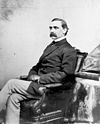 |
- Thomas Childs, class of 1814, military governor of Puebla, Mexico
- John H. Martindale, class of 1835, military Governor of Washington, D.C.
- Rufus Saxton, class of 1849, military governor of the Department of the South
- Fitzhugh Lee, class of 1856, military governor of Havana, Cuba
- Philip Sheridan, class of 1853, military governor of the Fifth Military District
- Douglas MacArthur, class of 1903, military governor of Japan
- George S. Patton, class of 1909, military governor of Bavaria
- Joseph T. McNarney, class of 1915, military governor of U.S. Occupation Zone, Germany
- Matthew Ridgway, class of 1917, military governor of Japan
- Lucius D. Clay, class of 1918, military Governor in West Germany noted for Berlin Airlift
Legislators
|
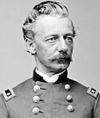  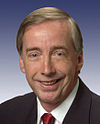 |
- Daniel Azro Ashley Buck, class of 1808, U.S. Representative (1823–1825, 1827–1829), Vermont
- Daniel Tunern, class of 1814, U.S. Representative, North Carolina (1827–1829)
- James Monroe, class of 1815, U.S. Representative (1839–1841), New York
- George Wurtz Hughes, class of 1827, U.S. Representative (1859–1861), Maryland
- Jefferson Davis, class of 1828, U.S. Representative (1845–1846) and Senator (1847–1853, elected but not seated 1875), Mississippi
- Alexander C.M. Pennington, class of 1828, represented New Jersey's 5th congressional district in the United States House of Representatives 1853–1857
- Joseph E. Johnston, class of 1829, U.S. Representative, Virginia
- Henry Bell Van Rensselaer, class of 1831, U.S. Representative, New York
- Robert Milligan McLane, class of 1837, U.S. Representative, Maryland
- John B. S. Todd, class of 1837, U.S. Congressman, Dakota Territory (1861–1863, 1864–1865)
- James Madison Leach, class of 1838, U.S. Representative, North Carolina
- Isaac Ingalls Stevens, class of 1839, U.S. Representative, Washington Territory
- Egbert Ludoricus Viele, class of 1847, U.S. Representative, New York
- Ambrose Burnside, class of 1847, U.S. Senator, Rhode Island (1875–1881)
- Henry Warner Slocum, class of 1852, U.S. Representative, New York (1869–1873, 1883–1884)
- Henry A. du Pont, class of 1861, U.S. Senator, Delaware (1895–1896, 1906–1917)
- Joseph Wheeler, class of 1859, U.S. Representative, Alabama (1881–1882, 1883, 1885–1900)
- Frank Obadiah Briggs, class of 1872, U.S. Senator, New Jersey
- Jesse Matlack Baker, class of 1873, Pennsylvania State Representative (1889-1892) and State Senator (1893-1897)
- Lawrence D. Tyson, class of 1883, U.S. Senator, Tennessee (1925–1929)
- Bertram Tracy Clayton, class of 1886, U.S. Representative, New York (1899–1901)
- Charles Henry Martin, class of 1887, U.S. Representative, Oregon
- Butler Ames, class of 1894, U.S. Representative, Massachusetts
- Frank Kowalski, class of 1930, U.S. Representative from Connecticut
- Nile Soik, class of 1945, member of the Wisconsin State Legislature
- Howard Hollis Callaway, class of 1949, U.S. Representative, Georgia (1965-1967)
- John Michael Murphy, class of 1950, U.S. Representative, New York (1963-1981)
- Adam Benjamin Jr., class of 1958, U.S. Representative, Indiana (1977–82)
- Jack Reed, class of 1971, U.S. Representative (1991–1997), U.S. Senator (1997- ), Rhode Island
- John Shimkus, class of 1980, U.S. Representative, Illinois (1997– 2021)
- Geoff Davis, class of 1981, U.S. Representative, Kentucky (2004– 2012)
- Mike Pompeo, class of 1986, U.S. Representative, Kansas (2011–2017)
- Mark Green, class of 1986, U.S. Representative, Tennessee (2019– )
- Brett Guthrie, class of 1987, U.S. Representative, Kentucky (2009– )
- Warren Davidson, class of 1995, U.S. Representative, Ohio (2016– )
- Steve Watkins, class of 1999, U.S. Representative, Kansas (2018– )
- Pat Ryan, class of 2004, U.S. Representative, New York (2022– )
- John James, class of 2004, U.S. Representative, Michigan (2023–)
- Wesley Hunt, class of 2004, U.S. Representative, Texas (2023–)
Mayors
|
- William Lewis Cabell, class of 1850, Mayor of Dallas, Texas (1874–76, 1877–79, 1883–85)
- Frank Fischl, class of 1951, Mayor of Allentown, Pennsylvania (1978–1982)
- Robert M. Isaac, class of 1951, Mayor of Colorado Springs, Colorado (1979–1997)
- Matthew Collier, class of 1979, Mayor of Flint, Michigan (1988–1992)
- Maria Vedder Lowe, class of 1998, Mayor of St. Pete Beach, Florida (2014–2016)
- Adrian Perkins, class of 2008, Mayor of Shreveport, Louisiana (2018–2022)
Jurists
- John Archibald Campbell, ex-class of 1830, Associate Justice of the Supreme Court of the United States (1853-1861)
- Montgomery Blair, class of 1835, attorney for Dred Scott in landmark 1857 Supreme Court case Dred Scott v. Sandford, 20th United States Postmaster General (1861–1864)
- Francis Redding Tillou Nicholls, class of 1855, Chief Justice Louisiana Supreme Court (1892–1911)
- Richard Whitehead Young, class of 1882, Philippines Supreme Court Justice (1899–1901)
- Richard D. Cudahy, class of 1948, Judge on the United States Court of Appeals for the Seventh Circuit (1979-2015)
- Malcolm Jones Howard, class of 1962, Judge, United States District Court Eastern District of North Carolina (1987–2005)
- Mike Bowers, class of 1963, Georgia's longest-serving Attorney General (1981–1997)
- Eugene R. Sullivan, class of 1964, Chief Judge United States Court of Appeals for the Armed Forces (1986–2002)
- Rhesa Barksdale, class of 1966, U.S. Court of Appeals for the Fifth Circuit (1990–2009)
- Roy Moore, class of 1969, Chief Justice Alabama Supreme Court (2001–2003, 2013–2017)
- Bruce E. Kasold, class of 1973, Judge on the United States Court of Appeals for Veterans Claims (2003-2016)
Law enforcement and intelligence figures
- Fitz John Porter, class of 1845, New York City Police Commissioner
- William Farrar Smith, class of 1845, New York City Police Commissioner
- Frederick Dent Grant, class of 1871, New York City Police Commissioner
- Douglas I. McKay, class of 1905, New York City Police Commissioner
- Norman Schwarzkopf Sr., class of 1917
- Alva Revista Fitch, class of 1930
- Barry McCaffrey class of 1964, Drug Czar during Clinton Administration
- Donald B. Smith class of 1969, New York State Sheriff Association President, Putnam County Sheriff 2002–2018
- Keith B. Alexander class of 1974, Head of the National Security Agency, General – Commander of Cyber Command
- Lon Horiuchi, class of 1976
Literary figures and actors
|
- Henry Martyn Robert, class of 1857, author of Robert's Rules of Order
- William James Roe, class of 1867, author of satirical and metaphysical works, poet and artist
- John Wilson Ruckman, class of 1883, first editor of Journal of U.S. Artillery, author of numerous technical articles on gunnery
- Herbert H. Sargent, class of 1883, author of Napoleon Bonaparte's First Campaign, The Campaign of Marengo and The Campaign of Santiago de Cuba
- Cornelis DeWitt Willcox, class of 1885
- Col. Mark M. Boatner III, class of June 1943, author of Civil War Dictionary, Encyclopedia of the American Revolution
- Hal Moore, class of 1945, author of We Were Soldiers Once...And Young
- James Salter, class of 1945, prolific author, selected to the Academy of Arts and Letters
- Bill McWilliams, class of 1955, author of A Return To Glory
- Gus Lee, ex-class of 1966, honorary member of the class of 1970, author of China Boy, Chasing Hepburn
- Lucian Truscott IV, class of 1969, journalist and author of Dress Grey
- Brian Haig, class of 1975, novelist
- James Carafano, class of 1977, author of Winning the Long War
- Mark Valley, class of 1987, TV and movie actor
- Col. Gregory D. Gadson, class of 1989, movie actor
- Paula Broadwell, class of 1995, author
Military figures
Medal of Honor recipients
Main article: List of Medal of Honor recipients educated at the United States Military AcademyCivil War
|
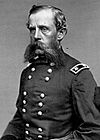 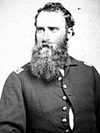 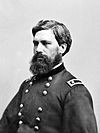 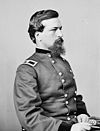  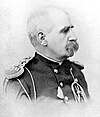 |
Indian Wars
|
     |
Spanish–American War
|
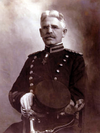 |
Philippine–American War
|
 |
Boxer Rebellion
|
Mexican Campaign (Veracruz)
|
 |
World War I
|
World War II
|
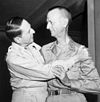 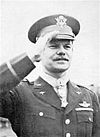 |
Korea
|
Vietnam
|
  |
Mexican–American War combatants
|
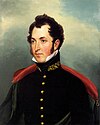 |
American Civil War combatants
Confederate States Army generals
Main article: List of Confederate States Army officers educated at the United States Military Academy
|
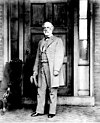   |
Union Army generals
Main article: List of Union Army officers educated at the United States Military Academy
|
  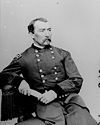 |
Indian Wars combatants and Buffalo Soldiers
|

- John Hanks Alexander, class of 1887
- Walker Keith Armistead, class of 1803
- John W. Barlow, class of 1861
- John T. Barnett, class of 1878
- Robert C. Buchanan, class of 1830
- Edward Canby, class of 1839
- Elias Chandler, class of 1880
- Philip St. George Cooke, class of 1827
- George Crook, class of 1852
- George Armstrong Custer, class of 1861
- John Wynn Davidson, class of 1845
- Henry Ossian Flipper, class of 1877
- James W. Forsyth, class of 1856
- Robert S. Garnett, class of 1841
- John Gibbon, class of 1847
- Oliver O. Howard, class of 1854
- Robert Lee Howze, class of 1888
- Charles King, class of 1866
- Thomas J. Lewis, class of 1875
- Gustavus Loomis, class of 1811
- Ranald S. Mackenzie, class of 1862
- Randolph B. Marcy, class of 1832
- Wesley Merritt, class of 1860
- George H. Morgan, class of 1880
- Edward Ord, class of 1839
- John J. Pershing, class of 1886
- John Pope (military officer), class of 1842
- Marcus Reno, class of 1857
- William Tecumseh Sherman, class of 1840
- Philip Sheridan, class of 1853
- Samuel D. Sturgis, class of 1846
- George Wright, class of 1822
- Charles Young, class of 1889
Spanish–American War and Philippine Insurrection combatants
|
- Stanley Dunbar Embick, class of 1899
- Frederick Dent Grant, class of 1871
- William G. Haan, class of 1889
- Hamilton S. Hawkins, class of 1855
- Guy Henry, class of 1898
- Lucius Roy Holbrook, class of 1896
- Willard Ames Holbrook, class of 1885
- Robert Lee Howze, class of 1888
- Richard L. Hoxie, class of 1868
- Jacob Ford Kent, class of 1861
- Charles King, class of 1866
- Fitzhugh Lee, class of 1856
- Manus MacCloskey, class of 1898
- Wesley Merritt, class of 1860
- Eben Swift, class of 1876
- Charles Symmonds, class of 1888
- Joseph Wheeler, class of 1859
- James H. Wilson, class of 1860
- John Moulder Wilson, class of 1860
Pancho Villa Expedition combatants
|
World War I combatants
Main article: List of World War I military personnel trained at the United States Military Academy
|
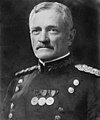   |
World War II combatants
Main article: List of World War II military personnel trained at the United States Military Academy- Note: "Class year" refers to the alumni's class year, which usually is the same year they graduated. However, due to the war in Europe, the Class of 1943 graduated early, in January '43, becoming the only class to do so.
|
    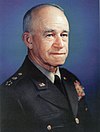 |
- Arthur F. Gorham, Class of 1938, First Commander of the 1/505th PIR, 82nd Airborne.
- Ulysses S. Grant III, Class of 1903. Major General; Head of Protection Branch, Office of Civilian Defense
- Leslie Groves, Class of 1918
- Alfred Gruenther, Class of 1919
- Hubert R. Harmon, Class of 1915
- Albert Hawkins, Class of 1917
- William M. Hoge, Class of 1916
- Geoffrey Keyes, Class of 1913
- John C. H. Lee, Class of 1909
- Lyman Lemnitzer, Class of 1920
- Herbert B. Loper, Class of 1919
- John P. Lucas, Class of 1911
- Vicente Lim, Class of 1914, served under Douglas MacArthur, general Philippine Scouts
- Anthony McAuliffe, Class of 1918
- John P. McConnell, Class of 1932
- Horace L. McBride, Class of 1916, Commander of the 80th Infantry Division
- Lesley J. McNair, Class of 1904
- Joseph T. McNarney, Class of 1915
- Frank Merrill, Class of 1929
- Virgil R. Miller, Class of 1924. Regimental Commander of the 442d Regimental Combat Team
- James Edward Moore, Class of 1924
- Otto L. Nelson, Jr., Class of 1924
- Andrew P. O'Meara, Class of 1930
- Alexander Patch, Class of 1913
- Matthew Ridgway, Class of 1917.
- Edward Rowny, Class of 1941
- John Dale Ryan, Class of 1938
- Antulio Segarra, Class of 1927
- William Hood Simpson, Class of 1909
- Brehon B. Somervell, Class of 1914
- Daniel Isom Sultan, Class of 1907
- Maxwell D. Taylor, Class of 1922
- Thomas J. H. Trapnell, Class of 1927
- William H. Tunner, Class of 1928
- George V. Underwood, Jr., Class 1937
- James Van Fleet, Class of 1915
- Jonathan Wainwright, Class of 1906
- Walton Walker, Class of 1912
- Albert Coady Wedemeyer, Class of 1919
- Raymond Albert Wheeler, Class of 1911
- Major general in United States Army Corps of Engineers developing a transportation network in the Middle East to ship munitions to the Soviet Union (1942–1943); South East Asia Command on the staff of Admiral Lord Louis Mountbatten, Supreme Allied Commander South East Asia, where duties including directing construction of the Ledo Road (1943–1944); Lieutenant general and Deputy Supreme Allied Commander South East Asia (1944–1945), during which he was the US representative accepting the Japanese surrender in Singapore. Immediately after the war, became the Army Corps of Engineers' overall Chief of Engineers.
- Thomas D. White, Class of 1920
- assistant chief of staff for operations, and then chief of staff, of the Third Air Force at MacDill Field, Florida,(1942–1943); assistant chief of air staff for intelligence Army Air Forces Headquarters at The Pentagon, Virginia (January to August 1944); deputy commander of the Thirteenth Air Force in the Southwest Pacific, taking part in the campaigns of New Guinea, Southern Philippines and Borneo; assumed command of the Seventh Air Force, which had based its headquarters in the Marianas and immediately moved with it to the recently taken Okinawa (June 1945 to beyond war's end). Would later be the Chief of Staff of the United States Air Force.
- Walter K. Wilson Jr., Class of 1929
- during WWII was a Lieutenant colonel in Army Corps of Engineers, Deputy Engineer-in-Chief with the South East Asia Command (1943–1945); Commanding General, Advance Section, U.S. Forces, China Burma India Theater, and Chief of Staff of X Force (the Chinese Army in India) (1945). Would later be the Army Corps of Engineers' overall Chief of Engineers.
Korean War combatants
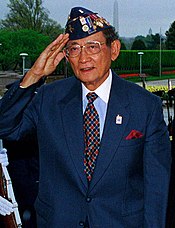
- Creighton Abrams, class of 1936, Corps Chief of Staff, Korean War. In 1980, the United States Army named its then-new main battle tank, the M1 Abrams, after him.
- Arnold W. Braswell, class of 1948
- Mark Wayne Clark, class of 1917
- J. Lawton Collins, class of 1917
- Lawrence Russell Dewey, class of 1924
- James Van Fleet, class of 1915
- Alexander Haig, class of 1947
- William M. Hoge, class of 1916
- Lyman Lemnitzer, class of 1920
- Douglas MacArthur, class of 1903
- Andrew P. O'Meara, class of 1930
- Ralph Puckett, class of 1949, Commander of 8th Army Ranger Company
- Fidel V. Ramos, class of 1950, Platoon leader of the 20th Battalion Combat Team, Philippine Expeditionary Forces to Korea
- Matthew Ridgway, class of 1917
- Davis C. Rohr, class of 1952
- Edward Rowny, class of 1941
- Maxwell D. Taylor, class of 1922
- Thomas J. H. Trapnell, class of 1927
- William H. Tunner, class of 1928
- Sam S. Walker, class of 1946
- Walton Walker, class of 1912
- Roderick Wetherill, class of 1940. later major general in the Vietnam War
Vietnam War combatants
- Creighton Abrams, class of 1936, commanded the U.S. Army Military Assistance Command, Vietnam (1968–1972)
- Alfred Judson Force Moody, class of 1941, Brigadier General, died of a heart attack one week after arriving in Vietnam
- George W. Casey Sr., class of 1945, Major General, killed in a helicopter crash in Vietnam
- Anderson W. Atkinson, class of 1946
- Richard J. Tallman, class of 1949, Brigadier General; killed by North Vietnamese artillery fire, last US Army General to die in South Vietnam.
- Peter J. Boylan, class of 1961
- Wesley Clark, class of 1966
- Harry Griffith Cramer Jr., class of 1946
- Eugene Peyton Deatrick, class of 1946
- Jack K. Farris, class of 1957
- Alexander Haig, class of 1947
- Paul D. Harkins, class of 1929
- Harold Keith Johnson, class of 1933
- Nicholas S. H. Krawciw, class of 1959
- Barry McCaffrey, class of 1964
- Montgomery Meigs, class of 1967
- Hal Moore, class of 1945, commanded 1st Battalion, 7th Cavalry Regiment in the Ia Drang Valley (1965)
- Joseph J. Nazzaro, class of 1936
- Robin Olds, class of 1943
- George Patton IV, class of 1946
- Ralph Puckett, class of 1949, Commander 2d Battalion, 502d Infantry (Airborne), 101st Airborne Division
- Fidel V. Ramos, class of 1950, Chief of Staff of the Philippine Military Contingent and Civil Action Group to Vietnam (1965–1968)
- Davis C. Rohr, class of 1952
- Hoyt S. Vandenberg Jr., class of 1951
- Sam S. Walker, class of 1946
- William Westmoreland
Gulf War combatants
|
  |
War on Terror
Participants
|
Afghanistan combatants
|
Iraq combatants
|
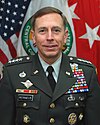  |
Supreme Allied Commanders of NATO
- Dwight Eisenhower, class of 1915
- Lyman Lemnitzer, class of 1922
- Andrew Goodpaster, class of 1939
- Bernard W. Rogers, class of 1943
- Alexander Haig, class of 1947
- John Galvin, class of 1954
- George Joulwan, class of 1961
- Wesley Clark, class of 1966
- Curtis M. Scaparrotti, class of 1978
Chairmen of the Joint Chiefs of Staff
- Omar N. Bradley, class of 1915, CJCS, 1949–1953
- Nathan F. Twining, class of 1919, CJCS, 1957–1960
- Lyman L. Lemnitzer, class of 1920, CJCS, 1960–1962
- Maxwell D. Taylor, class of 1922, CJCS, 1962–1964
- Earle G. Wheeler, class of 1932, CJCS, 1964–1970
- George Scratchley Brown, U.S. Air Force, class of 1941, CJCS, 1974–1978
- Martin E. Dempsey, class of 1974, CJCS, 2011–2015
Army Chiefs of Staff/Commanders of the Army
- George B. McClellan, class of 1846, Commanding General of the Army (1861–1862)
- Henry Wager Halleck, class of 1839, Commanding General of the Army (1862–1864)
- Ulysses S. Grant, class of 1843, Commanding General of the Army (1864–1869)
- William Tecumseh Sherman, class of 1840, Commanding General of the Army (1869–1883)
- Philip Sheridan, class of 1853, Commanding General of the Army (1883–1888)
- John Schofield, class of 1853, Commanding General of the Army (1888–1895)
- J. Franklin Bell, class of 1878, 4th U.S. Army Chief of Staff (1906–1910)
- Hugh L. Scott, class of 1876, 7th U.S. Army Chief of Staff (1914–1917)
- Tasker H. Bliss, class of 1875, 8th U.S. Army Chief of Staff (1917–1918)
- Peyton C. March, class of 1888, 9th U.S. Army Chief of Staff (1918–1921)
- John Pershing, class of 1886, 10th U.S. Army Chief of Staff (1921–1924)
- John L. Hines, class of 1891, 11th U.S. Army Chief of Staff (1924–1926)
- Charles Pelot Summerall, class of 1892, 12th U.S. Army Chief of Staff (1926–1930)
- Douglas MacArthur, class of 1903, 13th U.S. Army Chief of Staff (1930–1935)
- Malin Craig, class of 1898, 14th U.S. Army Chief of Staff (1935–1939)
- Dwight D. Eisenhower, class of 1915, 16th U.S. Army Chief of Staff (1945–1948)
- Omar Bradley, class of 1915, 17th U.S. Army Chief of Staff (1948–1949)
- J. Lawton Collins, class of 1917, 18th U.S. Army Chief of Staff (1949–1953)
- Matthew Ridgway, class of 1917, 19th U.S. Army Chief of Staff (1953–1955)
- Maxwell D. Taylor, class of 1922, 20th U.S. Army Chief of Staff (1955–1959)
- Lyman Lemnitzer, class of 1920, 21st U.S. Army Chief of Staff (1959–1960)
- Earle Wheeler, class of 1932, 23rd U.S. Army Chief of Staff (1962–1964)
- Harold Keith Johnson, class of 1933, 24th U.S. Army Chief of Staff (1964–1968)
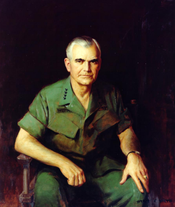
- William Westmoreland, class of 1936, 25th U.S. Army Chief of Staff (1968–1972)
- Bruce Palmer Jr., class of 1936, Acting U.S. Army Chief of Staff (1972)
- Creighton Abrams, class of 1936, 26th U.S. Army Chief of Staff (1972–1974)
- Bernard W. Rogers, class of 1943, 28th U.S. Army Chief of Staff (1976–1979)
- Edward C. Meyer, class of 1951, 29th U.S. Army Chief of Staff (1979–1983)
- John Wickham, class of 1950, 30th U.S. Army Chief of Staff (1983–1987)
- Carl E. Vuono, class of 1957, 31st U.S. Army Chief of Staff (1987–1991)
- Dennis Reimer, class of 1962, 33rd U.S. Army Chief of Staff (1995–1999)
- Eric Shinseki, class of 1965, 34th U.S. Army Chief of Staff (1999–2003)
- Martin E. Dempsey, class of 1974, 37th U.S. Army Chief of Staff (2011)
- Raymond T. Odierno, class of 1976, 38th U.S. Army Chief of Staff (2011–2015)
- James C. McConville, class of 1981, 40th US. Army Chief of Staff (2019–2023)
- Randy A. George, class of 1988, 41st U.S. Army Chief of Staff (2023-present)
Chiefs of the National Guard Bureau / Chiefs of the Militia Bureau
- Erasmus M. Weaver Jr., class of 1875, 1st Chief of the Militia Bureau (1908-1911)
- Robert K. Evans, class of 1875, 2nd Chief of the Militia Bureau (1911-1912)
- Albert Leopold Mills, class of 1879, 3rd Chief of the Militia Bureau (1912-1916), Medal of Honor recipient in the Spanish-American War (Battle of San Juan Hill)
- George W. McIver, class of 1882, acting Chief of the Militia Bureau (September–October 1916)
- William Abram Mann, class of 1875, 4th Chief of the Militia Bureau (1916-1917)
- Jesse McI. Carter, class of 1886, 5th Chief of the Militia Bureau (1917-1918 and 1919-1921)
- John W. Heavey, class of 1891, acting Chief of the Militia Bureau (1918-1919)
- Donald W. McGowan, attended 1919-1922, 16th Chief of the National Guard Bureau (1959-1963)
- Raymond F. Rees, class of 1966, acting Chief of the National Guard Bureau (August–September 1994 and 2002-2003)
- Daniel R. Hokanson, class of 1986, 29th Chief of the National Guard Bureau (2020–present)
Chiefs of the Army Corps of Engineers
The Chief of Engineers also commands the United States Army Corps of Engineers. As commander of the US Army Corps of Engineers, the Chief of Engineers leads a major Army command that is the world's largest public engineering, design, and construction management agency.
- Frederick J. Clarke - class of 1937, 41st Chief of Engineers and commanding general of the United States Army Corps of Engineers (1969-1973)
- William C. Gribble Jr. - class of 1941, 42nd Chief of Engineers (1973-1976)
- John W. Morris - class of 1943 (June), 43rd Chief of Engineers (1976-1980)
- Joseph K. Bratton - class of 1948, 44th Chief of Engineers (1980-1984)
- Elvin R. Heiberg III - class of 1953, 45th Chief of Engineers (1984-1988)
- Henry J. Hatch - class of 1957, 46th Chief of Engineers (1988-1992)
- Robert L. Van Antwerp Jr. - class of 1972, First Captain of the Corps of Cadets, 51st Chief of Engineers (2007-2011)
- Todd T. Semonite - class of 1979, 54th Chief of Engineers (2016-2020)
- Scott A. Spellmon - class of 1986, 55th Chief of Engineers (2020-present)
Air Force Chiefs of Staff
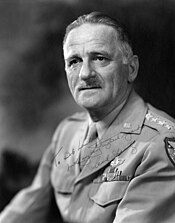
- Carl Spaatz, class of 1914, 1st USAF Chief of Staff (1947–1948)
- Nathan Farragut Twining, class of 1918, 3rd USAF Chief of Staff (1953–1957)
- Thomas D. White, class of 1920, 4th USAF Chief of Staff (1957–1961)
- John P. McConnell, class of 1932, 6th USAF Chief of Staff (1965–1969)
- John Dale Ryan, class of 1938, 7th USAF Chief of Staff (1969–1973)
- George Scratchley Brown, class of 1941, USAF Chief of Staff (1973–1974)
- Lew Allen, class of 1946, 10th USAF Chief of Staff (1978–1982)
- Charles A. Gabriel, class of 1950, 11th USAF Chief of Staff (1982–1986)
- Michael Dugan, class of 1958, 13th USAF Chief of Staff (1990)
Chief of Staff of non-American armed forces
- Douglas MacArthur, class of 1903, Field Marshal of the Armed Forces of the Philippines (1935–1946)
- Fidel V. Ramos, class of 1950, Chief of Staff of the Armed Forces of the Philippines (1986–1988)
Presidential and Congressional awardees
Presidential Medal of Freedom recipients
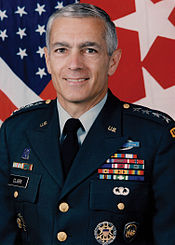
- Brent Scowcroft, class of 1947, medal awarded in 1991
- Buzz Aldrin
- Michael Collins
- Omar Bradley
- Wesley Clark
- Norman Schwarzkopf Jr.
- Earl Blaik
Congressional Gold Medal recipients
Congressional Space Medal of Honor recipients
Religious Figures
- Father Paul K. Hurley, class of 1984, 24th Chief of Chaplains of the US Army (2015-2019)
- Michael J. Almeyda, class of 2005, Pastor at Refuge Ranch Ministries
Scientists, inventors, and physicians
- Benjamin Alvord, class of 1833, mathematician
- Seth Barton, class of 1849 (USA and CSA), chemist
- George Bomford, class of 1805, inventor of ordnance and explosives; standardized army usage as Chief of the Ordnance Department
- John James Abert, class of 1811, head topographer for the U.S. Army; his officers mapped the American West under his supervision
- Benjamin Bonneville, class of 1815, organized expedition that explored the Great Salt Lake, crossed the Sierras, found the headwaters of the Yellowstone and discovered the Humboldt River
- George Washington Whistler, class of 1819, invented contour lines on maps, father of James McNeill Whistler, the artist, husband of "Whistler's Mother"
- Robert Parker Parrott, class of 1824, invented the Parrott rifle used extensively during the American Civil War
- Ormsby M. Mitchel, class of 1825, astronomer
- Henry du Pont, class of 1833, improved the production of gunpowder, chemicals industry pioneer. Father of Henry A. du Pont, class of 1861, and Medal of Honor recipient
- Thomas Jackson Rodman, class of 1841, inventor of the Rodman gun
- William W. Averell, class of 1855, inventor of asphalt
- John Wilson Ruckman, class of 1883, inventor of artillery devices critical in World War I
- George O. Squier, class of 1887, developer of Muzak, early radio engineer
- Leslie Groves, class of 1918, chief engineer for the Manhattan Project and the Pentagon
- Edward A. Murphy Jr., class of 1940, credited with the invention of Murphy's Law
- Peter Huybers, class of 1996, MacArthur Foundation Grant awardee ("Genius Grant"), planetary and climate scientist, currently a professor at Harvard
- John T. Thompson, class of 1882, inventor of the Thompson submachine gun
- Edward S. Holden, class of 1870, astronomer, librarian at West Point, 5th president of the University of California, Founder, Lick observatory
- Isaac Newton Lewis, class of 1884, inventor of the Lewis gun
Graduates Involved with the Manhattan Project
|
   |
Sportspeople
Main article: List of sportspeople trained at the United States Military AcademyAthletes
|
 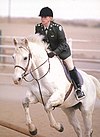   |
Coaches
|
  |
Television and movie figures
- James Salter, class of 1945, screenwriter
- Rod Lurie, class of 1984, director, screenwriter. Directed The Outpost (2019)
- Mark Valley, class of 1987, actor
- Kelly Perdew, class of 1989, reality show winner, The Apprentice (2004)
- Greg Plitt, class of 2000, fitness supermodel and actor

Eponyms
- Ambrose Burnside, class of 1847 – sideburns
- Robert Parker Parrott, class of 1824 - inventor of the Parrott rifle used extensively during the American Civil War
- Thomas Jackson Rodman, class of 1841 - inventor of the Rodman gun
- Henry Martyn Robert, class of 1857 – Robert's Rules of Order
- John T. Thompson, class of 1882 – inventor of the Thompson submachine gun, also known as the "Tommy Gun"
- Isaac Newton Lewis, class of 1884 - inventor of the Lewis gun
- Creighton Abrams, class of 1936 - M1 Abrams tank
- Edward A. Murphy Jr., class of 1940 – Murphy's Law
Places named for graduates
|
Graduates depicted on currency
- James B. McPherson, $2 bill, 1890s
- Pierre Gustave Toutant de Beauregard, $20 1863 State of Louisiana, Shreveport
- Joseph K. Mansfield, $500 1873, 1875, 1878, 1880 United States (legal tender) notes
- George Henry Thomas, $5 1890, 1891 Treasury or coin notes
- Jefferson Davis, on Confederate notes
- George Meade, $1,000 1890, 1891 Treasury notes
- Robert E. Lee, on U.S. coins, the 1937 Battle of Antietam Half Dollar Commemorative, and 1925 Stone Mountain Commemorative
- George McClellan, on 1937 Battle of Antietam Half Dollar Commemorative, 10¢ 1863 Searsport Bank, Maine, $1 1862 Chicopee Bank, Mass., $2 1861 Merchants Bank, N.J., $20 1862 Rutland County Bank, Vt.
- Stonewall Jackson, on U.S. coin, the 1925 Stone Mountain Commemorative, $500 17 Feb. 1864, Confederate note
- William T. Sherman, 15¢ fractional currency (proof notes), fourth issue, never circulated
- Winfield Scott Hancock, $2 silver certificates 1880s-90s
- Ulysses S. Grant, class of 1843, on 1922 Grant Memorial Half Dollar and current U.S. $50 bill
- Philip Sheridan, $5 1896 silver certificate (back), $10 1890, 1891 Treasury or coin notes
- Douglas MacArthur, 2500 piso gold, 1980, Philippines
- Dwight D. Eisenhower, $1 coin from 1971 to 1978, and 1990 Eisenhower Centennial Dollar
- Fidel V. Ramos, 2000 piso gold, 1996, Philippines
-
 $1 coin. Dwight D. Eisenhower, class of 1915 on obverse. The reverse is based on the Apollo 11 mission patch designed by Michael Collins, class of 1952.
$1 coin. Dwight D. Eisenhower, class of 1915 on obverse. The reverse is based on the Apollo 11 mission patch designed by Michael Collins, class of 1952.
-
 $50 bill. U.S. Grant, class of 1846
$50 bill. U.S. Grant, class of 1846
-
 $5 silver certificate with U.S. Grant and Phillip Sheridan
$5 silver certificate with U.S. Grant and Phillip Sheridan
-
 U.S. Grant on a gold certificate
U.S. Grant on a gold certificate
Graduates depicted on postage stamps
- Alden Partridge, class of 1806, appears on 11¢ Great Americans series stamp (1985)
- Sylvanus Thayer, class of 1808, appears on 9¢ Great Americans series stamp (1985)
- Jefferson Davis, class of 1828, appears on 6¢ Stone Mountain Memorial commemorative stamp (1970), 32¢ Civil War commemorative stamp (1995) and eight Confederate stamps
- Joseph E. Johnston, class of 1829, appears on 32¢ Civil War commemorative stamp (1995)
- Robert E. Lee, class of 1829, appears on 4¢ Army commemorative stamp (1937), 30¢ Liberty series stamp (1955 and 1957), 6¢ Stone Mountain Memorial stamp (1970), and 32¢ Civil War commemorative stamp (1995)
- Montgomery Blair, class of 1835, appears on 15¢ airmail stamp (1963) and on one Belgian stamp
- William Tecumseh Sherman, class of 1840, appears on 8¢ stamps (1893 and 1895), 3¢ Army commemorative stamp (1937), 32¢ Civil War commemorative stamp (1995), and on stamps from Guam, the Philippines, and Puerto Rico
- Ulysses S. Grant, class of 1843, appears on 5¢ stamps (1890, 1895, 1898), 4¢ stamp (1903), 8¢ stamp (1922), 3¢ Army commemorative stamp (1937), 18¢ Presidential series stamp (1938), 32¢ Civil War commemorative stamp (1995)
- Winfield Scott Hancock, class of 1844, appears on 32¢ Civil War commemorative stamp (1995)
- Stonewall Jackson, class of 1846, appears on 4¢ Army commemorative stamp (1937) and 6¢ Stone Mountain Memorial stamp (1970)
- Phillip Sheridan, class of 1853, appears on 3¢ Army commemorative stamp (1937)
- George Washington Goethals, class of 1880, appears on 3¢ Panama Canal commemorative stamp (1939) and on stamps issued for the Panama Canal Zone
- John J. Pershing, class of 1886, appears on 8¢ Liberty series stamp (1961) and on French stamps
- John L. Hines, class of 1891, appears on 33¢ Distinguished Soldiers commemorative stamp (2000)
- Douglas MacArthur, class of 1903, appears on 6¢ commemorative stamp (1971) and on stamps from Korea and the Philippines
- Joseph Stilwell, class of 1904, appears on 10¢ Distinguished Americans series stamp (2000)
- Henry H. Arnold, class of 1907, appears on 65¢ Great Americans series stamp (1988)
- George S. Patton Jr., class of 1909, appears on 3¢ commemorative stamp (1953) and on stamps from Belgium and Luxembourg.
- Omar Bradley, class of 1915, appears on 33¢ Distinguished Soldiers commemorative stamp (2000)
- Dwight D. Eisenhower, class of 1915, appears on 6¢ commemorative stamp (1969), 6¢ (1970) and 8¢ (1971) Prominent Americans series stamps, and on stamps of other countries
- Frank Borman, class of 1950, appears on ten stamps of Haiti, Hungary, and Senegal
- Fidel V. Ramos, class of 1950, appears on numerous Philippine Stamps since the 1990s
- Buzz Aldrin, class of 1951, appears on foreign stamps
Graduates selected as Time Magazine's "Person of the Year"
- Hugh S. Johnson, class of 1903, Man of the Year – 1933
- Dwight D. Eisenhower, class of 1915, Man of the Year – 1944, 1959
- General William Westmoreland, class of 1936, Man of the Year – 1965
- Col. Frank Borman, Apollo 8, Men of the Year – 1968 (shared honor with U.S. Naval Academy graduates James Lovell and Col. William Anders)
Other
- Maj. Gen. Samuel Ringgold, class of 1818; the "father of modern artillery"
- Maj. David Moniac, class of 1822
- Gen. Albert Sidney Johnston, class of 1826
- Lt. Gen. Leonidas Polk, class of 1827
- Gen. Jefferson Davis, class of 1828
- Gen. Robert E. Lee, class of 1829
- Maj. Gen. Whitfield Jack, class of 1928
- Gen. Joseph E. Johnston, class of 1829
- Maj. Gen. Francis Henney Smith, class of 1835
- Gen. George Meade, class of 1835
- Maj. Gen. Montgomery C. Meigs, class of 1836
- Gen. Braxton Bragg, class of 1837
- Lt. Gen. Jubal Early, class of 1837
- Maj. Gen. Joseph Hooker, class of 1837
- Gen. Pierre Gustave Toutant (P.G.T.) Beauregard, class of 1838
- Maj. Gen. E.R.S. Canby, class of 1839
- Maj. Gen. Henry Wager Halleck, class of 1839
- Lt. Gen. Richard S. Ewell, class of 1840
- Gen. William Tecumseh Sherman, class of 1840
- Col. Abner Doubleday, class of 1842
- Gen. James Longstreet, class of 1842
- Maj. Gen. William Rosecrans, class of 1842
- Gen. Ulysses S. Grant, class of 1843
- Lt. Gen. and Gov. Simon Bolivar Buckner, class of 1844
- Maj. Gen. Winfield Scott Hancock, class of 1844
- Gen. Stonewall Jackson, class of 1846
- Maj. Gen. George B. McClellan, class of 1846
- Maj. Gen. George Pickett, class of 1846; graduated last in the class
- Maj. Gen. Ambrose Burnside, class of 1847
- Lt. Gen. A. P. Hill, class of 1847
- Maj. Gen. John Buford, class of 1848
- Jerome Napoleon Bonaparte II, class of 1848
- Brig. Gen. Eugene Asa Carr, class of 1850
- Maj. Gen. Alvan Cullem Gillem, class of 1851
- Maj. Gen. George Crook, class of 1852
- Gen. John Bell Hood, class of 1853
- Lt. Gen John Schofield, class of 1853
- Gen. Philip Sheridan, class of 1853
- Maj. Gen. Oliver O. Howard, class of 1854
- Gen. Jeb Stuart, class of 1854
- Gen. George Armstrong Custer, class of June 1861; graduated last in class
- Brig. Gen. William Louis Marshall, class of 1868
- Gen. Tasker H. Bliss, class of 1875
- Brig. Gen. Willard Young class of 1875; first Mormon graduate and son of Brigham Young
- Maj. Gen. Hugh L. Scott, class of 1876
- Henry O. Flipper, class of 1877; first black American graduate
- Maj. Gen. J. Franklin Bell, class of 1878
- Lt. Gen. Hunter Liggett, class of 1879
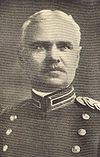
- George Washington Goethals, class of 1880
- Maj. Gen. John Wilson Ruckman, class of 1883
- General of the Armies John J. Pershing, class of 1886
- General Peyton C. March, class of 1888
- General John L. Hines, class of 1891
- General Charles Pelot Summerall, class of 1892
- Maj. Gen. Fox Conner, class of 1898
- Robert E. Wood, class of 1900
- Thomas Selfridge, class of 1903; the first person to die in a crash of a powered airplane
- Gen. Lesley J. McNair, class of 1904
- Gen. Joseph W. "Vinegar Joe" Stilwell, class of 1904
- Gen. Jonathan Mayhew Wainwright IV, class of 1906
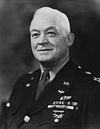
- General of the Air Force Henry "Hap" Arnold, class of 1907
- Lt. Gen. Simon Bolivar Buckner Jr., class of 1908
- Gen. Jacob L. Devers, class of 1909
- Gen. Robert L. Eichelberger, class of 1909
- Gen. George S. Patton, class of 1909
- Lt. Gen. William Hood Simpson, class of 1909
- Gen. Wade H. Haislip, class of 1912
- Lt. Gen. Walton Walker, class of 1912
- Gen. Alexander Patch, class of 1913
- Maj. Gen Junius Wallace Jones, class of 1913
- Brig. Gen. Vicente Lim, class of 1914
- Gen. Brehon B. Somervell, class of 1914
- Gen. Carl Andrew Spaatz, class of 1914
- General of the Army Omar Bradley, class of 1915
- General of the Army Dwight Eisenhower, class of 1915
- Gen. Hubert Harmon, class of 1915
- Gen. Joseph T. McNarney, class of 1915
- Lt. Gen. George E. Stratemeyer, class of 1915
- Gen. James Van Fleet, class of 1915
- Gen. Robert Neyland, class of 1916
- Gen. Mark W. Clark, class of 1917
- Gen. J. Lawton Collins, class of 1917
- Maj. Gen. Norman Cota, class of 1917
- Maj. Gen. Ernest N. Harmon, class of 1917
- Gen. Matthew B. Ridgway, class of 1917
- Maj. Gen. Norman Schwarzkopf Sr., class of 1917
- Gen. Lucius D. Clay, class of June 1918
- Lt. Gen Leslie Groves, class of November 1918
- Gen. Alfred Gruenther, class of 1919
- Gen. Anthony McAuliffe, class of 1919
- Gen. Williston B. Palmer, class of 1919
- Earl Blaik, class of 1920
- Gen. Maxwell D. Taylor, class of 1922
- Col. Mickey Marcus, class of 1924
- Gen. James Edward Moore, class of 1924
- Lt. Gen. James M. Gavin, class of 1929
- Gen. Harold K. Johnson, class of 1933
- Lt. Gen. Leighton I. Davis, class of 1935
- Gen. Creighton Abrams, class of 1936
- Lt. Gen. Benjamin O. Davis Jr., class of 1936
- Gen. William Westmoreland, class of 1936
- Gen. Rafael Ileto, class of 1943
- Gen. Bernard W. Rogers, class of 1943
- Gen. Anastasio Somoza Debayle, class of 1946
- Col. Thomas L. Gatch Jr., class of 1946
- Gov. Warren E. Hearnes, class of 1946
- Lt. Gen. Brent Scowcroft, class of 1947
- Gen. Alexander Haig, class of 1947
- Col. Frank Borman, class of 1950
- Gen. Fidel V. Ramos, class of 1950
- Col. Buzz Aldrin, class of 1951
- Gen. Roscoe Robinson Jr., class of 1951
- Michael Collins, class of 1952
- Lt. Col. Ed White, class of 1952
- Gen. Norman Schwarzkopf Jr., class of 1956
- John Block, class of 1957
- Brig. Gen. Pete Dawkins, class of 1959
- Col. Jim Nicholson, class of 1961
- Maj. James Kimsey, class of 1962
- Gen. George A. Fisher Jr., class of 1964, commander of Multi-National Force – Haiti during Operation Uphold Democracy (1995)
- Gen. Barry McCaffrey, class of 1964
- Gen. Eric K. Shinseki, class of 1965
- Gen. Wesley Clark, class of 1966
- Brig. Gen. Thomas E. White, class of 1967
- Maj. Gen. Albert Madora, class of 1968
- Capt. Mike Krzyzewski, class of 1969
- Capt. Roy Moore, class of 1969
- Brig. Gen. Patrick Finnegan, class of 1971
- Capt. Jack Reed, class of 1971
- Gen. Richard A. Cody, class of 1972, U.S. Army Vice Chief of Staff (2004-2008)
- Col. William S. McArthur, class of 1973
- Gen. Keith B. Alexander, class of 1974
- Gen. Martin Dempsey, class of 1974
- Gen. David Petraeus, class of 1974
- Gen. Walter L. Sharp, class of 1974
- Capt. Louis Caldera, class of 1978
- Gen. John F. Campbell, class of 1979, U.S. Army Vice Chief of Staff (2013-2014)
- José María Figueres, class of 1979
- Col. Robert L. Gordon III, class of 1979
- Maj. Gen. Gregg F. Martin, class of 1979
- Gen. Daniel B. Allyn, class of 1981, U.S. Army Vice Chief of Staff (2014-2017)
- Capt. Geoff Davis, class of 1981
- Maj. Gen. Nadja West, class of 1982, the first black Army Surgeon General, the first black female active-duty major general, and the first black female major general in Army medicine
- Gen. Joseph M. Martin, class of 1986, U.S. Army Vice Chief of Staff (2019–2022)
- Maj. Gen. Diana M. Holland, class of 1990; the first female commandant of cadets at West Point; first female deputy commanding general of a light infantry division; first woman promoted to Maj. Gen. in the active component of the Army's engineer branch
- Lt. Col Jen Easterly, class of 1990; director of Cybersecurity and Infrastructure Security Agency under the Biden Administration
- Lt. Dan Choi, class of 2003; founding member and spokesperson of Knights Out, an organization of West Point alumni who support the rights of LGBT soldiers to serve openly
- Capt. Alejandro Villanueva, class of 2010; football offensive tackle for the Pittsburgh Steelers in the National Football League
- Lt. Josh McNary, class of 2011; football linebacker for the Indianapolis Colts in the National Football League
- Gen. Randy A. George, class of 1988, U.S. Army Vice Chief of Staff (2022–present)
Non-graduates
Main article: List of United States Military Academy non-graduate alumni- As these alumni did not graduate, their class year represents the year they would have graduated if they had completed their education at the Academy.
|
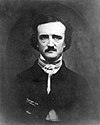 |
References
- General references
a: Special Collections: Biographical Register of the Officers and Graduates of the U. S. Military Academy. West Point, NY: United States Military Academy Library. 1950.
b: "Civil War Generals from West Point". University of Tennessee – Knoxville. 2003. Archived from the original on 5 June 2009. Retrieved 28 June 2009.
- Inline citations
- ^ Moon, Kristen. "What Students Need To Know Before Applying To One of the United States Military Academies". Forbes. Retrieved 12 February 2021.
- "U.S. Military Academy established". HISTORY. Retrieved 12 February 2021.
- ^ "Quick Facts". Go Army Sports.com. Archived from the original on 3 May 2011. Retrieved 4 March 2009.
- Edson, James (1954). The Black Knights of West Point. New York: Bradbury & Sayles.
- "Army plans games for home gridiron". The New York Times. 15 January 1947. Retrieved 4 March 2009.
- "FAQ: Who Attends the US Military Academy". Office of Admissions. Archived from the original on 19 June 2009. Retrieved 21 March 2009.
- "Overview of the Academy". Office of Admissions. Archived from the original on 21 June 2009. Retrieved 21 March 2009.
- "College Navigator – United States Military Academy". National Center for Education Statistics, United States Department of Education. Retrieved 21 March 2009.
- "Academic Catalog: "The Redbook"". Office of the Dean, USMA. Archived from the original on 9 January 2009. Retrieved 21 March 2008.
- "Medal of Honor Citations". Army Center of Military History. Archived from the original on 11 June 2009. Retrieved 27 January 2010.
- "Notable USMA Graduates". United States Military Academy. Archived from the original on 18 May 2009. Retrieved 21 March 2009.
- "Scholarship Winners". Office of the Dean, USMA. Archived from the original on 9 January 2009. Retrieved 19 December 2008.
- "Prof. Horace Webster" (PDF). The New York Times. 14 July 1871. Retrieved 6 June 2009.
- "Dennis Hart Mahan". Smithsonian Institution. Retrieved 13 June 2009.
- C., J. (1868). "Obituary: Alexander Dallas Bache". Monthly Notices of the Royal Astronomical Society. 28 (1). Royal Astronomical Society: 72–75. Retrieved 5 March 2008.
- Dupuy, Trevor N.; Johnson, Curt; Bongard, David L. (1992). Harper Encyclopedia of Military Biography (1 ed.). Castle Books. p. 601. ISBN 0-7858-0437-4.
- ^ "Commanders of the Corps of Engineers". United States Army Corps of Engineers. Archived from the original on 22 May 2009. Retrieved 31 May 2009.
- Trowbridge, W. P. (2005). Memoir of William A. Norton 1810–1883. National Academies Press. pp. 191–199.
- "Benjamin Stoddert Ewell". The New York Times. 21 June 1894. Retrieved 13 June 2009.
- "West Point Fifty Years Ago". University of Chicago. Retrieved 6 June 2009.
- "Brigadier General Montgomery C. Meigs". Army Quartermaster Corps. Archived from the original on 10 June 2010. Retrieved 14 June 2009.
- Wise, Jennings Cropper (1915). The Military History of the Virginia Military Institute from 1839 to 1865. Lynchburg, VA: J. P. Bell Company, Inc. pp. 55–56. Retrieved 13 June 2009.
William Gilham vmi.
- "Bushrod Johnson". National Park Service. Retrieved 14 June 2009.
- "Josiah Gorgas (1818-1883)". Smithsonian Institution. Retrieved 28 September 2009.
- "About Us". Harvard School of Engineering and Applied Sciences. Archived from the original on 14 July 2009. Retrieved 14 June 2009.
- "Daniel Harvey Hill". Civil War Home. Retrieved 6 June 2009.
- Eicher, John H.; Eicher, David J. (2001). Civil War High Commands. Stanford University Press. pp. 493–494. ISBN 0-8047-3641-3.
- Nofi, Albert A. (1995). A Civil War Treasury: Being a Miscellany of Arms and Artillery, Facts and Figures, Legends and Lore, Muses and Minstrels, Personalities and People. Da Capo Press. pp. 347–348. ISBN 0-306-80622-3.
- Eicher, John H.; Eicher, David J. (2001). Civil War High Commands. Stanford University Press. pp. 316, 517. ISBN 0-8047-3641-3.
- ^ "Medal of Honor Recipients, Civil War (A–L)". Army Center of Military History. Archived from the original on 2 September 2012. Retrieved 4 April 2009.
- ^ "Civil War Medal of Honor Citations Last names starting with "H" and "I"". American Civil War. Retrieved 3 April 2009.
- Gordon, William (1914). Major-General George Washington Custis Lee. Richmond, VA: Virginia Historical Society. p. 8. Retrieved 19 April 2009.
- Wakelyn, Jon L. (1977). Biographical Dictionary of the Confederacy. Westport, CT: Greenwood Press. p. 282. ISBN 0-8371-6124-X.
- Warner, Ezra J. (1959). Baton Rouge, LA (ed.). Generals in Gray: Lives of the Confederate Commanders. Louisiana State University Press. pp. 183–184, 345. ISBN 0-8071-0823-5.
- ^ "Medal of Honor Recipients Civil War (M–Z)". Army Center of Military History. Archived from the original on 23 February 2009. Retrieved 2 April 2009.
- ^ Tagg, Larry (1998). The Generals of Gettysburg. New York City: Savas Publishing: Da Capo Press. pp. 50–51. ISBN 1-882810-30-9. Archived from the original on 22 October 2014. Retrieved 11 April 2009.
- "PROF. CHAPLIN'S NEW POST.; HE WILL BE CHANCELLOR OF THE WASHINGTON UNIVERSITY". The New York Times. 30 August 1891. ISSN 0362-4331. Retrieved 1 January 2023.
- "John Wilson Ruckman". University of Illinois Alumni Association at Urbana. Archived from the original on 26 December 2004. Retrieved 15 June 2009.
- "Biography of Dwight D. Eisenhower". whitehouse.gov. Retrieved 6 September 2008 – via National Archives.
- Bernstein, Adam (29 August 2006). "Robert McDermott; Air Force Academy Dean". The Washington Post. Retrieved 1 April 2009.
- "Schenly Plaza, Schenley Park & Environs" (PDF). University of Pittsburgh. Archived from the original (PDF) on 27 June 2010. Retrieved 22 June 2009.
- "General James R. Allen". United States Air Force. 1983. Archived from the original on 12 December 2012. Retrieved 22 June 2009.
- "Lieutenant General Charles R. Hamm". United States Air Force. Archived from the original on 12 December 2012. Retrieved 22 June 2009.
- Roch, Jessica (1 September 2005). "ST president speaks candidly". Cauldron Online. University of St. Thomas. Archived from the original on 28 September 2007. Retrieved 23 June 2009.
- "John Mearsheimer". The Globalist. Archived from the original on 14 July 2009. Retrieved 23 June 2009.
- "Alden Partridge". United States Military Academy. 31 January 2002. Archived from the original on 14 January 2009. Retrieved 6 April 2009.
- "Sylvanus Thayer (1785–1872) Class Of 1808". West Point in the Making of America. Smithsonian Institution. Retrieved 7 April 2009.
- "The Sylvanus Thayer Award". West Point Association of Graduates. Archived from the original on 22 August 2009. Retrieved 7 April 2009.
- "Civil War Defenses of Washington". National Park Service. Retrieved 19 April 2009.
- Boatner III, Mark Mayo (1988) . The Civil War Dictionary. New York: McKay. p. 84. ISBN 0-8129-1726-X.
- Freeman, Douglas S. (1934). R.E. Lee, A Biography. New York City: Charles Scribner's Sons. pp. 301, 375–95, 425, 476, 602. Retrieved 19 April 2009.
- "Civil War Defenses of Washington". National Park Service. Archived from the original on 13 January 2016. Retrieved 19 April 2009.
- Williams, T. Harry (1955). P.G.T. Beauregard: Napoleon in Gray. Louisiana State University Press. pp. 2–47, 91–168, 203–07. ISBN 0-8071-1974-1.
- Johnson, Frederick Charles (1889). The Historical Record. Vol. 3. Wilkes-Barre, Pennsylvania: Press of the Wilkes-Barre Record. pp. 111–112. Retrieved 19 April 2009.
- "Zealous Bates Tower". Aztec Club. Retrieved 19 April 2009.
- "Culllum Society". West Point Association of Graduates. Archived from the original on 22 August 2009. Retrieved 19 April 2009.
- "Thomas Gamble Pitcher". Arlington National Cemetery. Retrieved 19 April 2009.
- "Georgia Governors' Gravesites Field Guide, 1776–2003" (PDF). Georgia Historic Preservation Division. Archived from the original (PDF) on 18 January 2006. Retrieved 19 April 2009.
- ^ Eicher, John H.; Eicher, David J. (2001). Civil War High Commands. Stanford, CA: Stanford University Press. pp. 472–473. ISBN 0-8047-3641-3.
- "Col. John G. Parke" (PDF). The New York Times. 18 December 1900. Retrieved 20 April 2009.
- Leonard, John W.; Marquis, Albert Nelson (1913). Who's who in America. Vol. III. Chicago, IL: A.N. Marquis & Co. pp. 655–656. Retrieved 20 April 2009.
- ^ "Medal of Honor Recipients War With Spain". Army Center of Military History. Archived from the original on 23 April 2009. Retrieved 12 April 2009.
- "Gen. A.L. Mills, Ill 12 Hours, Dies" (PDF). The New York Times. Retrieved 12 April 2009.
- "Hugh Lenox Scott". Arlington National Cemetery. Retrieved 21 April 2009.
- "General T.H. Barry Dies in Washington" (PDF). The New York Times. 31 December 1919. Retrieved 25 April 2009.
- "Past USMA & WPAOG Leadership". West Point Association of Graduates. Retrieved 25 April 2009.
- "Col. Biddle To West Point". The New York Times. 18 May 1916. Retrieved 29 April 2009.
- "Tillman, Samuel Escue". The Mineralogical Record. 2009. Archived from the original on 22 August 2009. Retrieved 25 April 2009.
- ^ "Medal of Honor Recipients World War II (M-S)". Army Center of Military History. Archived from the original on 30 April 2008. Retrieved 2 April 2009.
- Thompson, Paul (24 July 2005). "Douglas MacArthur: Born to Be a Soldier". Voice of America. Archived from the original on 14 August 2009. Retrieved 11 April 2009.
- Sladen, Joseph Alton; Sweeney, Edwin Russell (1997). Making Peace With Cochise: The 1872 Journal of Captain Joseph Alton Sladen. Norman, OK: University of Oklahoma Press. pp. xiii. ISBN 0-8061-2973-5. Retrieved 25 April 2009.
- "At West Point". Time. 17 October 1927.
- "Major General Edwin B. Winans". Brigham Young University. Retrieved 21 April 2009.
- "Smith, William Ruthven". Texas State Historical Association. 18 January 2008. Retrieved 25 April 2009.
- "Jay Leland Benedict". Arlington National Cemetery. Retrieved 25 April 2009.
- "Robert Lawrence Eichelberger". Arlington National Cemetery. Retrieved 22 April 2009.
- "Gen. Francis B. Wilby, 82, Dies; Headed West Point During War". The New York Times. 21 November 1965.
- ^ Krebs, Albin (21 April 1987). "Maxwell D. Taylor, Soldier and Envoy, Dies". The New York Times. Retrieved 22 April 2009.
- "Death on the Han". Time. 5 March 1951. Archived from the original on 21 August 2009. Retrieved 22 April 2009.
- "Frederick Augustus Irving" (PDF). Bowdoin College. Archived from the original (PDF) on 2 August 2010. Retrieved 23 April 2009.
- "New Command Team in Korea". Time. 5 March 1951. Archived from the original on 31 August 2009. Retrieved 24 April 2009.
- Ray, Max (1980). The History of the First United States Army From 1918 to 1980. Fort Meade MD: First United States Army. pp. 120, 124.
- "Obituary: General William Westmoreland". The Independent. Retrieved 24 April 2009.
- ^ Sarantakes, Nicholas Evan (2001). Keystone: The American Occupation of Okinawa and U.S.–Japanese Relations. College Station, TX: Texas A&M University Press. p. 185. ISBN 0-89096-969-8. Retrieved 25 April 2009.
- Bartelt, Eric S. (9 December 2005). "Former Superintendent dies". United States Military Academy. Archived from the original on 4 July 2007. Retrieved 24 April 2009.
- Stout, David (11 February 2006). "Gen. S.W. Koster, 86, Who Was Demoted After My Lai, Dies". The New York Times. Retrieved 24 April 2009.
- "Hollister Knowlton Betrothed To David H. Petraeus, a Cadet". The New York Times. 12 May 1974. p. GN57. Retrieved 24 April 2009.
- "What Price Honor?". Time. 7 June 1976. Archived from the original on 21 August 2009.
- "General Andrew J. Goodpaster, USA". NATO. Archived from the original on 13 February 2009. Retrieved 24 April 2009.
- "United States Army, V Corps Leaders". V Corps. 27 June 2008. Archived from the original on 24 April 2009. Retrieved 25 April 2009.
- "2005 Distinguished Graduate Award: David R. Palmer". West Point Association of Graduates. Archived from the original on 22 August 2009. Retrieved 20 April 2009.
- Eric Pace (16 September 2003). "Gen. Howard D. Graves, 64; Led West Point and Texas A&M". The New York Times. Retrieved 4 April 2009.
- "Lieutenant General Daniel W. Christman". West-Point.org. Retrieved 19 April 2009.
- Hamburger, Andrea (19 July 2002). "USMA celebrates St. Cyr's bicentennial". United States Military Academy. Archived from the original on 22 August 2009. Retrieved 25 April 2009.
- John Doherty (28 February 2006). "New Point leader named". Times Herald-Record. Archived from the original on 27 September 2013. Retrieved 22 September 2013.
- "Lt. Gen. David H. Huntoon Jr. Becomes New Superintendent of West Point". Fox News. 22 July 2010. Retrieved 22 September 2013.
- Mike Strasser (17 July 2013). "Caslen assumes command of West Point". United States Army. Retrieved 22 September 2013.
- "West Point gets 1st black superintendent in 216-year history". Army Times. Associated Press. 1 July 2018. Retrieved 1 January 2023.
- "West Point Welcomes New Superintendent". U.S. Military Academy. West Point, New York: West Point Public Affairs. 24 June 2022. Retrieved 25 June 2022.
- "Frank Borman". National Aeronautics and Space Administration (NASA). December 1993. Retrieved 15 February 2009.
- Borman, Frank; Serling, Robert J. (October 1988). Countdown: An Autobiography. Silver Arrow. p. 13. ISBN 0-688-07929-6.
- "Buzz Aldrin, Ph.D. (Colonel, USAF, Ret.)". NASA. January 1996. Retrieved 15 February 2009.
- ^ "Astronauts and the BSA". Boy Scouts of America. Archived from the original on 14 April 2009. Retrieved 20 March 2006.
- "Michael Collins (Brigadier General, USAF, Ret.)". NASA. December 1994. Retrieved 15 February 2009.
- Collins, Michael; Charles Lindbergh (2001). Carrying the Fire: An Astronaut's Journeys. Cooper Square Press. pp. 8–14. ISBN 0-8154-1028-X.
- "Edward H. White, II (Lieutenant Colonel)". NASA. December 1997. Retrieved 15 February 2009.
- "David R. Scott (Colonel, USAF, Ret.)". NASA. December 1975. Retrieved 15 February 2009.
- "Donald H. Peterson (Colonel, USAF, Ret.)". NASA. May 1994. Archived from the original on 28 June 2011. Retrieved 15 February 2009.
- ^ "Graduates and Former Cadets". USMA. Archived from the original on 15 May 2009. Retrieved 22 March 2009.
- "Alfred Merrill Worden". NASA. December 1993. Archived from the original on 30 October 2007. Retrieved 15 February 2009.
- "Richard M. Mullane (Colonel, USAF, Ret.)". NASA. January 1996. Retrieved 15 February 2009.
- "Sherwood C. (Woody) Spring (Colonel, USA, Ret.)". NASA. December 1994. Archived from the original on 18 April 2011. Retrieved 15 February 2009.
- "James C. Adamson (Colonel, U.S. Army, Ret.)". NASA. October 2002. Retrieved 15 February 2009.
- "William Surles "Bill" McArthur, Jr., (Colonel, USA, Ret.)". NASA. March 2007. Retrieved 15 February 2009.
- "Michael Richard "Rich" Clifford (Lieutenant Colonel, USA)". NASA. January 1997. Retrieved 15 February 2009.
- "Charles D. (nickname Sam) Gemar (Lieutenant Colonel, USA)". NASA. March 1997. Archived from the original on 23 October 2012. Retrieved 15 February 2009.
- "Patrick G. Forrester (Colonel, USA, Ret.)". NASA. July 2008. Archived from the original on 23 November 2013. Retrieved 15 February 2009.
- "Jeffrey N. Williams (Colonel, USA, Ret.)". NASA. January 2009. Retrieved 15 February 2009.
- "Douglas H. Wheelock (Colonel, USA)". NASA. February 2009. Archived from the original on 17 September 2013. Retrieved 15 February 2009.
- Schwartz, John (20 July 2008). "Murcer's Jersey Made a Journey to Outer Space". The New York Times. Retrieved 22 March 2009.
- "Timothy L. Kopra (Colonel, USA)". NASA. March 2008. Retrieved 15 February 2009.
- "Robert S. Kimbrough (Lieutenant Colonel, USA)". NASA. December 2008. Archived from the original on 14 May 2016. Retrieved 15 February 2009.
- "Tech Alumnus Selected for NASA's Astronaut Class of 2004". Georgia Institute of Technology. 7 May 2004. Archived from the original on 20 May 2011. Retrieved 22 March 2009.
- "Astronaut Frank Rubio". 5 June 2017.
- "Andrew R. Morgan (M.D.) (Col., U.S. Army) NASA Astronaut". 21 February 2016.
- Whiting, Melanie (3 October 2018). "Anne C. McClain (Col, U.S. Army) NASA Astronaut". nasa.gov. NASA. Retrieved 5 December 2018.
- "Amazon.com: War as I Knew It (Audible Audio Edition): George Patton, Ray Atherton, Recorded Books: Books". Amazon.
- We are soldiers still : a journey back to the battlefields of Vietnam (Archived), p. 221-222
- "Joe Galloway and Hal Moore: We Are Soldiers Still | Pritzker Military Museum & Library | Chicago". pritzkermilitary.org.
- "Search". Mises Institute. 29 November 2010. Archived from the original on 11 October 2014. Retrieved 3 March 2016.
- Bass, Gary J. (3 September 2010). "Endless War". The New York Times. Archived from the original on 15 February 2017. Retrieved 24 February 2017 – via NYTimes.com.
- Robert l. Caslen, Jr; Matthews, Michael D. (13 October 2020). The Character Edge: Leading and Winning with Integrity: Caslen Jr., Robert L., Matthews, Michael D.: 9781250259080: Amazon.com: Books. St. Martin's Publishing. ISBN 978-1250259080.
- "Bob Mayer: Books, biography, latest update". Amazon.
- "About | Bob Mayer".
- https://www.amazon.com/Night-Saddam-Mark-Green/dp/0557153190?dib=eyJ2IjoiMSJ9.GfZtGDU6E58ERleHGEy39w.Pb9bQyFbSzCwUHpeTvPY6Yissk_5JmziEK3vWxRV2f0&dib_tag=se&keywords=9780557153190&qid=1730297728&sr=8-1
- McCormick, David (February 1998). The Downsized Warrior: America's Army in Transition: McCormick, David H.: 9780814755846: Amazon.com: Books. NYU Press. ISBN 0814755844.
- McCormick, David (28 December 2023). Superpower in Peril: A Battle Plan to Renew America: McCormick, David: 9781546001959: Amazon.com: Books. Center Street. ISBN 978-1546001959.
- https://www.amazon.com/Take-Command-Leadership-Principles-Military/dp/1596980001
- Louis, Matthew (24 September 2019). Mission Transition: Navigating the Opportunities and Obstacles to Your Post-Military Career: Louis, Matthew J.: 9781400214754: Amazon.com: Books. HarperCollins Leadership. ISBN 978-1400214754.
- Louis, Matthew (4 September 2023). Hiring Veterans: How To Leverage Military Talent for Organizational Growth: Louis, Matthew: 9781632652096: Amazon.com: Books. Career Press. ISBN 978-1632652096.
- "John W. Gunnison Expedition". National Park Service. Retrieved 31 May 2009.
- "West Point in the Making of America". Smithsonian Institution. Archived from the original on 7 April 2009. Retrieved 31 May 2009.
- ^ Eicher, John H.; Eicher, David J. (2001). Civil War High Commands. Stanford, CA: Stanford University Press. ISBN 978-0-8047-3641-1.
- "Orlando Metcalfe Poe". www.arlingtoncemetery.net (Unofficial website). Retrieved 31 May 2009.
- ^ "George Washington Goethals". Panama Canal Authority. Archived from the original on 22 June 2007. Retrieved 31 May 2009.
- Dodds, Gordon B. (Autumn 1963). "A Dedication to the Memory of Hiram Martin Chittenden, 1858–1917". Journal of the Southwest. 5 (3): 183–186. JSTOR 40167070.
- Chittenden, Hiram Martin (1902). The American fur trade of the far West: a history of the pioneer trading posts and early fur companies of the Missouri valley and the Rocky mountains and the overland commerce with Santa Fe ... F.P. Harper.
- Chittenden, Hiram Martin (1903). History of early steamboat navigation on the Missouri River : life and adventures... New York : Francis P. Harper.
- —— (1903). History of early steamboat navigation on the Missouri River : life and adventures of Joseph La Barge, Volume II . New York : Francis P. Harper.
- —— (1918). The Yellowstone national park, historical and descriptive. Cincinnati, Stewart & Kidd company.
- Chittenden, Hiram Martin (1915). The Yellowstone national park: historical and descriptive ... Stewart & Kidd company.
- Scott, Leslie M. (March 1918). "News and Comment-Death of Hiram M. Chittenden" . The Quarterly of the Oregon Historical Society. 19 (1). Oregon Historical Society: 73–87.
- Paths of Armor: The Fifth Armored Division in World War II. Nashville: The Battery Press. 1950. p. 15. ISBN 0-89839-084-2.
- "Hugh John Casey". www.arlingtoncemetery.net (Unofficial website). Retrieved 31 May 2009.
- ^ Dodd, William Edward (1907). Jefferson DavisAmerican crisis biographies. Philadelphia, PA: G.W. Jacobs & Company. p. 250. ISBN 9780722290484. OCLC 3508109. Retrieved 23 June 2009.
- ^ "The Career of a Soldier". The New York Times. 24 July 1885. Retrieved 24 June 2009.
- ^ "Biography of Dwight D. Eisenhower". whitehouse.gov. Archived from the original on 6 December 2020. Retrieved 6 September 2008 – via National Archives.
- "Biography of Anastacio Somoza Debayle". britannica.com. Encyclopædia Britannica. Retrieved 30 June 2009.
- "Westpoint Distinguished Graduate Award: DGA Fidel Ramos". Archived from the original on 2 December 2010. Retrieved 1 July 2009.
- "President José María Figueres". University of Missouri – St. Louis. Archived from the original on 20 November 2008. Retrieved 24 June 2009.
- "Biography of Hun Manet". britannica.com. Encyclopædia Britannica. Retrieved 8 January 2025.
- Registrar, USMA
- "Former U.S. Ambassadors To Austria". U.S. Embassy Vienna. 2009. Archived from the original on 7 September 2008. Retrieved 1 August 2009.
- ^ Cozzens, Peter (1990). No Better Place to Die: The Battle of Stones River. Champaign, IL: University of Illinois Press. pp. 26, 129, 166, 207. ISBN 978-0-252-01652-3.
- "Medal of Honor Recipients Civil War (M-Z)". Army Center of Military History. Archived from the original on 29 June 2009. Retrieved 2 April 2009.
- ^ Washington, Booker T. (1986). Up From Slavery. London: Penguin Classics. p. 279. ISBN 978-0-14-039051-3. Retrieved 11 April 2009.
- "Jerrold Martin North". www.usma1954.org.
- "State Magazine" (PDF). Retrieved 11 April 2017.
- "Galvin, John / Distinguished Graduate Award". Archived from the original on 16 May 2006. Retrieved 27 July 2006.
- "Paul O. Hebert". Secretary of State of Louisiana. Archived from the original on 7 March 2009. Retrieved 21 September 2009.
- Gott, Kendall D. (2003). Where the South Lost the War: An Analysis of the Fort Henry—Fort Donelson Campaign, February 1862. Mechanicsburg, Pennsylvania: Stackpole books. pp. 257–267. ISBN 978-0-8117-0049-8.
- "Gen. Dabney H. Maury Dead.; His Service in the United States and Confederate Armies". The New York Times. 12 January 1900. p. 2. Retrieved 13 December 2009.
- Welsh, Jack D. (1999). Medical Histories of Confederate Generals. Kent State University Press. p. 154. ISBN 978-0-87338-649-4.
- ^ "Guy Vernor Henry, Major General". www.arlingtoncemetery.net (Unofficial website). Archived from the original on 21 October 2007. Retrieved 11 April 2009.
- "Georgia Governors' Gravesites Field Guide, 1776–2003" (PDF). Georgia Historic Preservation Division. Archived from the original (PDF) on 18 January 2006. Retrieved 19 April 2009.
- "Medal of Honor Recipients, Civil War (A-L)". Army Center of Military History. Archived from the original on 27 December 2010. Retrieved 4 April 2009.
- ^ "Ames, Adelbert". Biographical Directory of the United States Congress. United States Congress. Retrieved 11 April 2009.
- Shavit, David (1990). The United States in Asia: A Historical Dictionary. Westport, Connecticut: Greenwood Publishing Group. p. 80. ISBN 0-313-26788-X. Retrieved 30 July 2011.
- Brush, Bryan (2007). "Confederate Brigadier General Humphrey Marshall". Bryan Brush. Archived from the original on 27 September 2007. Retrieved 12 July 2009.
- "Maxey, Samuel Bell, (1825–1895)". Biographical Directory of the United States Congress. Retrieved 27 December 2009.
- ^ Sears, Stephen W. (1988). George B. McClellan: The Young Napoleon. New York: Da Capo Press. pp. 27–91, 140–169. ISBN 978-0-306-80913-2.
- ^ "du Pont, Henry Algernon". Biographical Directory of the United States Congress. United States Congress. Retrieved 11 April 2009.
- "Pennington, Alexander Cumming McWhorter". Biographical Directory of the United States Congress. Retrieved 1 January 2023.
- 'Wisconsin Blue Book 1971, Biographical Sketch of Nile Soik, pg. 22
- ^ "Major General Luis Raúl Esteves Völckers". Bell South. 1 November 2002. Archived from the original on 27 January 2010. Retrieved 22 March 2010.
- Warner, Frank (14 October 2016). "Frank Fischl, decorated Air Force pilot and former Allentown mayor, dies at 89". The Morning Call. Retrieved 23 October 2016.
- "St. Pete Beach mayor resigns".
- ^ Hodge, F. W. (July 1896). "John Gregory Bourke". American Anthropologist. 9 (7): 245–248. doi:10.1525/aa.1896.9.7.02a00030. JSTOR 658692.
- "Civil War Medal of Honor citations Last names starting with "O" through "R"". American Civil War. Retrieved 3 April 2009.
- "Hatch, John P." Home of Heroes. Archived from the original on 14 May 2012. Retrieved 4 April 2009.
- "Orlando Bolivar Willcox". www.arlingtoncemetery.net (Unofficial website). Retrieved 11 April 2009.
- "Absalom Baird". www.arlingtoncemetery.net (Unofficial website). Retrieved 4 April 2009.
- ^ "Civil War Medal of Honor citations Last names starting with "S" through "Z"". American Civil War. Retrieved 10 April 2009.
- "Fiddler's Green: Charles H. Tompkins". Crossed Sabres. 15 May 2007. Retrieved 10 April 2009.
- "West Point Medal of Honor recipients". Home of Heroes. Archived from the original on 16 July 2012. Retrieved 11 April 2009.
- Bliss, Zenas Randall (2007). Thomas T. Smith; Jerry D. Thompson; Robert Wooster; Ben E. Pingenot (eds.). The Reminiscences of Major General Zenas R. Bliss, 1854–1876. College Station, TX: Texas A&M University Press with Texas State Historical Association. ISBN 978-0-87611-226-7.
- "Col. Abraham K. Arnold" (PDF). The New York Times. 24 November 1901. Retrieved 11 April 2009.
- ^ "Williams, Jonathan Mss". Lilly Library Manuscript Collections. Indiana University. Archived from the original on 14 December 2010. Retrieved 6 April 2009.
- Leonard, John W., ed. (1908). Who's who in Pennsylvania (2nd ed.). New York: L.R. Hamersly & Company. pp. 50–51. Retrieved 11 April 2009.
- "Benjamin, Samuel N." Home of Heroes. Archived from the original on 14 May 2012. Retrieved 11 April 2009.
- "Beebe, William S". Home of Heroes. Archived from the original on 25 May 2012. Retrieved 6 April 2009.
- "William Henry Harrison Benyaurd". MilitaryTimes.com. Archived from the original on 1 October 2011. Retrieved 9 April 2009.
- ^ "Medal of Honor recipients Indian Wars Period". Army Center of Military History. Archived from the original on 3 August 2013. Retrieved 12 April 2009.
- "Edward Settle Godfrey". www.arlingtoncemetery.net (Unofficial website). Retrieved 14 April 2009.
- "William Preble Hall". www.arlingtoncemetery.net (Unofficial website). Retrieved 13 April 2009.
- "Robert Goldthwaite Carter". www.arlingtoncemetery.net (Unofficial website). Retrieved 12 April 2009.
- "John Brown Kerr". www.arlingtoncemetery.net (Unofficial website). Retrieved 16 April 2009.
- "USMA Cullum file, #2347" (PDF). USMA Library Digital Collections. Archived from the original (PDF) on 10 January 2009. Retrieved 15 April 2009.
- Panzeri, Peter F. (1995). Little Big Horn 1876: Custer's Last Stand. Oxford, England: Osprey Publishing. p. 44. ISBN 1-85532-458-X. Retrieved 12 April 2009.
- "Frank West". www.arlingtoncemetery.net (Unofficial website). Retrieved 17 April 2009.
- "William Giles Harding Carter". www.arlingtoncemetery.net (Unofficial website). Retrieved 12 April 2009.
- "Marion Perry Maus". www.arlingtoncemetery.net (Unofficial website). Retrieved 15 April 2009.
- "Ernest Albert Garlington". www.arlingtoncemetery.net (Unofficial website). Retrieved 12 April 2009.
- Cullum, George W. (1891). Biographical Register of the Officers and Graduates of the U. S. Military Academy, Volume III. New York City: Houghton, Mifflin and Company. p. 265.
- "Guide to the Oscar Fitzalan Long papers, 1872–1926". UC Berkeley. Retrieved 16 April 2009.
- Kenner, Charles L. (1999). Buffalo Soldiers and Officers of the Ninth Cavalry, 1867–1898: Black & White Together. Norman, OK: University of Oklahoma Press. pp. 194, 202–206. ISBN 978-0-8061-7108-1.
- Willard, Francis E.; Livermore, Mary A., eds. (1903). A Woman of the Century. New York: Charles Wells Moulton. p. 654. ISBN 9780722217139. Retrieved 18 April 2009.
- Thrapp, Dan L. (1979). Conquest of Apacheria. Norman, OK: University of Oklahoma Press. p. 356. ISBN 0-8061-1286-7.
- "Lloyd Milton Brett". www.arlingtoncemetery.net (Unofficial website). Retrieved 18 April 2009.
- "Thomas Cruse". www.arlingtoncemetery.net (Unofficial website). Retrieved 17 April 2009.
- "George Horace Morgan". www.arlingtoncemetery.net (Unofficial website). Retrieved 13 April 2009.
- "Lieut. Powhatan Clarke Drowned" (PDF). The New York Times. 22 July 1893. Retrieved 13 April 2009.
- Goldstein, Richard (18 December 1998). "Gen. H.H. Howze, 89, Dies; Proposed Copters as Cavalry". The New York Times. Retrieved 12 April 2009.
- "Medal of Honor recipients War With Spain". Army Center of Military History. Archived from the original on 23 April 2009. Retrieved 12 April 2009.
- "Gen. A.L. Mills, Ill 12 Hours, Dies" (PDF). The New York Times. Retrieved 12 April 2009.
- "John William Heard". Military Times. Retrieved 12 April 2009.
- "List of Cadets, United States Military Academy, West Point, New York, From its Origin till June 30, 1937". U.S. Military Academy Printing Office. 1937. p. 61. Retrieved 28 October 2023.
- "Charles DuVal Roberts". www.arlingtoncemetery.net (Unofficial website). Retrieved 12 April 2009.
- Linnerud, Susan. "The Spanish War Class". United States Military Academy Library. Archived from the original on 25 November 2004. Retrieved 12 April 2009.
- ^ "Medal of Honor recipients Philippine Insurrection". Army Center of Military History. Archived from the original on 20 April 2008. Retrieved 9 April 2009.
- "Iowa Medal of Honor Heroes: Captain William Edward Birkhimer 3rd U.S. Artillery Philippine–American War". State Historical Society of Iowa. Archived from the original on 1 December 2008. Retrieved 9 April 2009.
- Moses, Edward M. (1999). West Point Battle Heroes, The Medal of Honor, An Historical Sketchbook. Fairfax Station, VA: Edward M. Moses and Robert A. Getz. p. 59. ISBN 0-9648939-8-3.
- ^ "Medal of Honor recipients China Relief Expedition (Boxer Rebellion)". Army Center of Military History. Archived from the original on 26 January 2010. Retrieved 3 April 2009.
- Ambrose, Steven E. (1966). Duty, Honor, Country: A history of West Point. Baltimore: The Johns Hopkins Press. p. 242. ISBN 0-8018-6293-0.
- "Medal of Honor recipients Mexican Campaign (Vera Cruz)". Army Center of Military History. Archived from the original on 23 July 2010. Retrieved 1 May 2009.
- "Brigadier General Eli Thompson Fryer". www.arlingtoncemetery.net (Unofficial website). Retrieved 1 May 2009.
- "Medal of Honor recipients World War I". Army Center of Military History. Archived from the original on 18 October 2008. Retrieved 28 March 2010.
- "Lieutenant Colonel Emory J. Pike". Iowa Medal of Honor Heroes. Retrieved 9 April 2009.
- "Medal of Honor recipients World War II (M–S)". Army Center of Military History. Archived from the original on 30 April 2008. Retrieved 2 April 2009.
- Thompson, Paul (24 July 2005). "Douglas MacArthur: Born to Be a Soldier". Voice of America. Archived from the original on 4 June 2011. Retrieved 11 April 2009.
- ^ "Medal of Honor recipients World War II (T–Z)". Army Center of Military History. Archived from the original on 31 December 2009. Retrieved 6 April 2009.
- Sinton, Starr (2003). World War II Medal of Honor recipients (2): Army and Air Corps. Osprey Publishing. pp. 7–8. ISBN 1-84176-614-3.
- USAF. "Junius W. Jones Biography". af.mil. U.S. Air Force. Retrieved 31 January 2017.
- ^ "Medal of Honor recipients World War II (A–F)". Army Center of Military History. Archived from the original on 16 June 2008. Retrieved 4 April 2009.
- "Demas T. Craw & Pierpont Morgan Hamilton". Hamilton National Genealogical Society. Archived from the original on 26 July 2011. Retrieved 11 April 2009.
- "Medal of Honor recipients World War II (G–L)". Army Center of Military History. Archived from the original on 30 April 2008. Retrieved 10 April 2009.
- "Leon William Johnson". www.arlingtoncemetery.net (Unofficial website). Retrieved 10 April 2009.
- "Brigadier General Frederick Walker Castle". Mountain Lakes Library. Archived from the original on 28 September 2007. Retrieved 10 April 2009.
- Leatherwood, Art. "COLE, ROBERT G." The Handbook of Texas Online. Archived from the original on 27 May 2009. Retrieved 6 April 2009.
- Hudson, William C. (Fall 2003). "Brothers in Arms". Sooner Magazine. University of Oklahoma Foundation. Archived from the original on 22 February 2009. Retrieved 6 April 2009.
- "M.J. Daly dies, Medal of Honor recipient". Connecticut Post. 25 July 2008.
- ^ "Medal of Honor recipients Korean War". Army Center of Military History. 27 January 2009. Archived from the original on 10 March 2009. Retrieved 5 April 2009.
- Lock, John D.; Moore, Harold G. (2001). To Fight With Intrepidity: The Complete History of the U.S. Army Rangers 1622 to Present. Fenestra Books. ISBN 1-58736-064-0.
- USMA class of 1982 recommendation for COL Puckett for the Distinguished Graduate Award Archived 2007-09-28 at the Wayback Machine
- Leo Shane III (19 May 2021). "Korean war hero to receive Medal of Honor this week". armytimes.com. Retrieved 19 May 2021.
- ^ "Medal of Honor recipients Vietnam (A–L)". Army Center of Military History. 24 November 2008. Archived from the original on 27 June 2009. Retrieved 2 April 2009.
- "Col. William A. Jones III". Air Force Link. Archived from the original on 12 December 2012. Retrieved 3 April 2009.
- "Andre C. Lucas". West Point.org. Archived from the original on 27 September 2007. Retrieved 3 April 2009.
- "One Who Was Belligerent". TIME Magazine. TIME. 11 December 1964. Archived from the original on 30 September 2007. Retrieved 3 April 2009.
- ^ "Medal of Honor recipients Vietnam (M–Z)". Army Center of Military History. 27 January 2009. Archived from the original on 24 April 2008. Retrieved 3 April 2009.
- "Rocky Versace Plaza Dedicated in Alexandria". FYI Online. University of Maryland University College. August 2002. Archived from the original on 14 June 2011. Retrieved 3 April 2009.
- Vetter, Larry (1996). "Chapter 2, The Reasoner Patrol". Never Without Heroes: Marine Third Reconnaissance Battalion in Vietnam, 1965–70. New York: Ivy Books. pp. 17–26. ISBN 0-8041-0807-2.
- "Medal of Honor: Paul W. Bucha". MSNBC Nightly News. 5 June 2007. Archived from the original on 19 May 2009. Retrieved 3 April 2009.
- "Samuel Ringgold (1796–1846)". National Portrait Gallery. Archived from the original on 19 April 2009. Retrieved 27 June 2009.
- ^ Moodey, John Sheldon (1889). The War of the Rebellion. United States War Dept. p. 512.
- "Charles Smith Hamilton". Thomas' Legion.net. Retrieved 5 March 2010.
- Davis, William C. "General Samuel Cooper." In Leaders of the Lost Cause: New Perspectives on the Confederate High Command, edited by Gary W. Gallagher and Joseph T. Glatthaar, 101-131. Mechanicsburg, PA: Stackpole Books, 2004.
- Freeman, Douglas S. (1934). R. E. Lee, A Biography. New York City: Charles Scribner's Sons. pp. 301, 375–95, 425, 476, 602. ISBN 0-684-10179-3. Retrieved 19 April 2009.
- Davis, Burke (1957). Jeb Stuart: The Last Cavalier. New York: Random House. pp. 19, 27, 33, 36–37, 237. ISBN 978-0-517-18597-1.
- Daniel, Larry J. (1997). Shiloh: The Battle That Changed the Civil War. New York: Simon & Schuster. pp. 138, 309–310. ISBN 978-0-684-80375-3.
- Fehrenbacher, Don; Fehrenbacher, Virginia (1 November 1996). Recollected Words of Abraham Lincoln. Stanford, California: Stanford University Press. ISBN 9780804764889. Retrieved 18 October 2016.
- Jordan, David M. (1988). Winfield Scott Hancock: A Soldier's Life. Bloomington, IN: Indiana University Press. pp. 10–34, 81–94, 198–201, 306–319. ISBN 978-0-253-36580-4.
- Wittenberg, Eric J. (2002). Little Phil: A Reassessment of the Civil War Leadership of Gen. Philip H. Sheridan. Washington, D.C.: Potomac Books. pp. 75–82, 116–160. ISBN 978-1-57488-548-4.
- Eicher, John H. and David J. (2001). Civil War High Command. Stanford, California: Stanford University Press. p. 539. ISBN 0-8047-3641-3. Retrieved 26 January 2020.
- Wert, Jeffry D. (196). Custer: The Controversial Life of George Armstrong Custer. New York: Simon & Schuster. pp. 15–18, 225. ISBN 978-0-684-81043-0.
- ^ "History of Fort Hunter Liggett". United States Army Installation Command. 29 December 2009. Archived from the original on 27 January 2010. Retrieved 21 March 2010.
- ^ "Soldier and Statesman: Tasker H. Bliss". United States Army. 30 August 2009. Retrieved 22 March 2010.
- ^ Vandiver, Frank E. (1977). Black Jack: The Life and Times of John J. Pershing – Volume I (3 ed.). College Station, TX: Texas A&M University Press. p. 67. ISBN 978-0-89096-024-0.
- ^ "John Leonard Hines". www.arlingtoncemetery.net (Unofficial website). 19 May 2007. Retrieved 21 March 2010.
- "Eben Swift". www.arlingtoncemetery.net (Unofficial website). Retrieved 21 August 2010.
- "Hugh Samuel Johnson". www.arlingtoncemetery.net (Unofficial website). Retrieved 22 March 2010.
- "Biography of Major-General Allen Wyant Gullion (1880 - 1946), USA". generals.dk. 4 July 2010. Retrieved 19 May 2013.
- ^ "George S. Patton". Virginia Military Institute. Retrieved 22 March 2010.
- ^ D'Este, Carlo (1995). Patton: A Genius for War. New York: Harper Perennial. pp. 58, 131. ISBN 978-0-06-092762-2. Cite error: The named reference "pattondeste" was defined multiple times with different content (see the help page).
- ^ Mets, David R. (1997). Master of Airpower: General Carl A. Spaatz. Presidio, CA: Presidio Press. pp. 260–61, 265. ISBN 0-89141-639-0.
- ^ "Biographical Register of the Officers and Graduates of the U.S. Military Academy" (PDF). United States Military Academy. Archived from the original (PDF) on 31 May 2010. Retrieved 24 April 2010.
- DuPre, Flint. "U.S. Air Force Biographical Dictionary". United States Air Force. Retrieved 12 July 2019.
- "Maj. Gen. Adna R. Chaffee, Jr. – 'Father of U.S. Armored Forces' | Armchair General Magazine - We Put YOU in Command!".
- "Douglas MacArthur". United States Army Center of Military History. Archived from the original on 7 March 2015. Retrieved 22 March 2010.
- "Henry Conger Pratt". United States Air Force. Archived from the original on 18 July 2012. Retrieved 7 September 2010.
- Tuchman, Barbara (1971). Stilwell and the American Experience in China, 1911–45. New York: Macmillan Co. pp. 9–15, 145, 231–32, 304–07. ISBN 0-02-620290-5.
- "Henry H. Arnold". Air and Space Power Journal. Archived from the original on 30 June 2009. Retrieved 22 March 2010.
- "Simon Bolivar Buckner, Jr. Papers" (PDF). The Eisenhower Presidential Library and Museum. Retrieved 27 March 2010.
- "Members of the Command and General Staff College Hall of Fame". Command and General Staff College. Archived from the original on 17 March 2010. Retrieved 28 March 2010.
- "Preliminary Guide to Twentieth Century Manuscripts in the U.S. Military Academy Library" (PDF). United States Military Academy. Archived from the original (PDF) on 31 May 2010. Retrieved 23 April 2010.
- "Stephen J. Chamberlin". Military Times. Retrieved 21 April 2010.
- "Omar Bradley". United States Army Center of Military History. Archived from the original on 14 January 2021. Retrieved 27 March 2010.
- Hollister, Jay (3 May 2001). "General Omar Nelson Bradley". University of San Diego. Archived from the original on 9 May 2008. Retrieved 27 March 2010.
- "Mark W. Clark Papers" (PDF). The Eisenhower Presidential Library and Museum. Retrieved 27 March 2010.
- "J. Lawton Collins". United States Army Center of Military History. Archived from the original on 5 May 2017. Retrieved 27 March 2010.
- "Norman D. Cota" (PDF). The Eisenhower Presidential Library and Museum. Retrieved 27 March 2010.
- "Lucius D. Clay". The New Georgia Encyclopedia. Retrieved 27 March 2010.
- "General's Histories". 11th Armored Division.com. Retrieved 20 August 2010.
- "William M. Miley obituary". The New York Times. 28 September 1997. Retrieved 25 April 2010.
- "Arthur L. McCullough". United States Air Force. Archived from the original on 20 July 2012. Retrieved 5 September 2010.
- "Major General Hugo P. Rush". United States Air Force. Archived from the original on 17 July 2012. Retrieved 17 February 2011.
- "Brigadier General Manus MacCloskey". United States Air Force. Archived from the original on 16 July 2012. Retrieved 26 January 2011.
- Kurzman, Dan (1970). Genesis 1948, The First Arab Israeli War. New York: Da Capo Press. pp. 439–43. ISBN 0-306-80473-5.
- "Herbert W. Ehrgott". United States Air Force. Archived from the original on 1 August 2012. Retrieved 29 August 2010.
- "Charles F. Born". United States Air Force. Archived from the original on 22 July 2012. Retrieved 28 August 2010.
- "Howard G. Bunker". United States Air Force. Archived from the original on 18 July 2012. Retrieved 28 August 2010.
- "Robert T. Frederick". Access My Library.com. 1 January 2009. Retrieved 28 March 2010.
- "John S. Mills". United States Air Force. Archived from the original on 16 July 2012. Retrieved 6 September 2010.
- "Harold Huntley Bassett". United States Air Force. Archived from the original on 19 July 2012. Retrieved 27 August 2010.
- "James M. Gavin". Internet Movie Database. Retrieved 28 March 2010.
- "Marshall S. Roth". United States Air Force. Archived from the original on 29 July 2012. Retrieved 8 September 2010.
- Goldstein, Richard (18 December 1998). "Hamilton H. Howze obituary". The New York Times. Retrieved 24 April 2010.
- "Phillips Waller Smith". United States Air Force. Archived from the original on 20 July 2012. Retrieved 9 September 2010.
- "Gordon Blake". United States Air Force. Archived from the original on 12 December 2012. Retrieved 27 March 2010.
- "David William Hutchison". United States Air Force. Archived from the original on 16 July 2012. Retrieved 2 September 2010.
- "Arno H. Luehamn". United States Air Force. Archived from the original on 16 July 2012. Retrieved 4 September 2010.
- "Thomas Cebern Musgrave, Jr". United States Air Force. Archived from the original on 16 July 2012. Retrieved 6 September 2010.
- "Robert M. Stillman 1935". West Point Association of Graduates. Retrieved 3 June 2013.
- "Benjamin O. Davis, Jr". Aviation-History.com. Retrieved 28 March 2010.
- "Richard W. Fellows". United States Air Force. Archived from the original on 12 December 2012. Retrieved 31 August 2010.
- United States Military Academy. Association of Graduates (1991). Assembly Volume 49, Issues 4-6. Association of Graduates, United States Military Academy. Retrieved 27 August 2024.
- "John S. Samuel". United States Air Force. Archived from the original on 18 July 2012. Retrieved 8 September 2010.
- "Donald V. Bennett Obituary". United States Military Academy. Archived from the original on 4 July 2007. Retrieved 27 March 2010.
- "Fred Ascani". United States Air Force. Archived from the original on 12 December 2012. Retrieved 27 March 2010.
- ^ "Robin Olds". United States Air Force. Archived from the original on 12 December 2012. Retrieved 26 April 2010.
- Willbanks, James (2005). The Battle of An Loc. Indiana University Press. p. 145. ISBN 9780253344816.
- Ward, Geoffrey; Burns, Ken (2017). The Vietnam War An Intimate History. Alfred A. Knopf. p. 498. ISBN 978-0307700254.
- "1994 Distinguished Graduate Award Citation H. Norman Schwarzkopf". West Point Association of Graduates. Archived from the original on 20 July 2009. Retrieved 23 March 2009.
- "2000 Distinguished Graduate Award Citation Gen Frederick M. Franks, Jr". West Point Association of Graduates. Archived from the original on 2 December 2010. Retrieved 23 March 2009.
- McCaffrey, Barry (24 June 2008). "Long Bio 062408" (PDF). McCaffrey Associates. Archived from the original (PDF) on 26 March 2009. Retrieved 1 December 2008.
- "Commander Stabilisation Force General Montgomery C. Meigs". NATO. Retrieved 14 June 2009.
- ^ Young, Rick. "Lessons of Vietnam: A Conversation With Major H. R. McMaster". PBS. Retrieved 23 March 2009.
- "About Dr. Mark T. Esper".
- Leiby, Richard (20 November 2001). "The Secret Warrior Gen. Wayne Downing, From West Point to White House". The Washington Post. Retrieved 23 March 2009.
- Mike Strasser (17 July 2013). "Caslen assumes command of West Point". U.S. Army. Retrieved 22 September 2013.
- "Is This The Man Who Will Get Bin Laden?". The Virginian Pilot. 13 May 2009. pp. A1, A12.
- Ivalua
- "General Robert B. Abrams" (PDF). www.usfk.mil.
- "General Richard D. Clarke Commander, U.S. Special Operations Command Official Biography" (PDF). Retrieved 10 December 2019.
- "General Officer Announcement".
- "General Michael e. Kurilla - General Officer Management Office".
- "Maj. Gen. Richardson assumes command of 1st Cav Div". Defense Visual Information Distribution Service. 21 July 2021. Retrieved 22 July 2021.
- Franklin, Eric (21 July 2021). "Fort Hood's 1st Cavalry Division welcomes new leader: Maj. Gen. John B. Richardson assumes command". 10 CBS KWTX. Gray Television, Inc. Retrieved 22 July 2021.
- "Biographical Data Book - Class 2019-4" (PDF). ndu.edu.
- "Lieutenant General Sean C. Bernabe". www.gomo.army.mil. Retrieved 1 January 2023.
- "U.S. Airborne troops arrive in Poland". Politico. 6 February 2022.
- "Lieutenant General Franklin L. Hagenbeck". United States Military Academy. Archived from the original on 22 April 2005. Retrieved 23 March 2009.
- ^ "General Lloyd J. Austin III". United States Department of Defense. Retrieved 22 December 2015.
- ^ "Security Transition Commander Reflects on Afghan Tour". Defense Link. 1 December 2008. Retrieved 23 March 2009.
- "Leadership in the Current Operating Environment: JSOC Commander Lt. Gen. Austin Miller". Modern War Institute. Modern War Institute. Retrieved 22 October 2018.
- Garamone, Jim (2 September 2018). "Miller Takes Over NATO, U.S. Commands in Afghanistan". Defense.gov. Archived from the original on 3 September 2018. Retrieved 3 September 2018.
- Starr, Barbara; Atwood, Kylie; Sidhu, Sandi; Gaouette, Nicole (12 July 2021). "Top US general in Afghanistan steps down as US military withdrawal from the country nears completion". CNN. Archived from the original on 12 July 2021. Retrieved 13 July 2021.
- Andriacco, Mike (7 July 2011). "RSC-N says farewell to former commander, welcomes new". Defense Video & Imagery Distribution System.
- Tice, Jim (4 May 2007). "Former CentCom chief retires". Army Times. Retrieved 25 March 2009.
- Burton, Danielle (27 March 2008). "10 Things You Didn't Know About David Petraeus". US News. Retrieved 24 March 2009.
- "Lieutenant General William B. Caldwell, IV" (PDF). U.S. Army Combined Arms Center and Fort Leavenworth. Retrieved 25 March 2009.
- "Reid Statement on Nomination Deal". The Senate. Archived from the original on 26 March 2009. Retrieved 1 April 2009.
- "Colonel Receives DSC for Leading Iraqi Commandos". Military.com. 29 August 2005. Retrieved 2 April 2009.
- "Death Comes Calling For the Class of 9/11". Time. 1 October 2006. Archived from the original on 5 November 2007.
- Eicher, John H.; David J. Eicher (2001). Civil War High Commands. Stanford University Press. p. 213. ISBN 0-8047-3641-3.
- "Battery Paul D. Bunker, BCN-127". The Fort MacArthur Museum Association. Retrieved 19 April 2010.
- Schmidt, Ray (November 1996). "Elmer Oliphant". College Football Historical Society Newsletter.
- "Special Collections: Biographical Register of the Officers and Graduates of the U. S. Military Academy, 1930, Vol 7" (PDF). United States Military Academy Library. 1930. pp. 1855–1856. Archived from the original (PDF) on 10 January 2009. Retrieved 4 April 2009.
- "Matt Bell Wins Roosma Award For Third Straight Year". Go Army Sports.com. Archived from the original on 11 March 2010. Retrieved 3 June 2009.
- Goldstein, Richard (10 April 2009). "Doc Blanchard, Army's Mr. Inside, Is Dead at 84". The New York Times. Retrieved 5 June 2009.
- "College Football Hall of Famer Glenn Davis Dies at 80". College Football Hall of Fame. 10 March 2005. Retrieved 24 May 2009.
- "Hartinger, James V." US Lacrosse. Archived from the original on 5 June 2009. Retrieved 24 May 2009.
- "Blaik Has His Problems, But Cadets Still Look Like National Champion". The Harvard Crimson. 21 October 1950. Retrieved 13 June 2009.
- Kavetski, Lee (16 June 1966). "Chotto Matte". Pacific Stars and Stripes. Retrieved 24 May 2009.
- "1958 -24th Award Peter Dawkins Army Back". Heisman Trophy. Archived from the original on 10 May 2009. Retrieved 24 May 2009.
- "Ron Zinn". Sports Reference.com. Archived from the original on 18 April 2020. Retrieved 24 May 2009.
- "Tom Lough Olympic Results". sports-reference.com. Archived from the original on 18 April 2020. Retrieved 18 August 2012.
- "OralHistory".
- "Michael Barnwell Silliman". Go Army Sports.com. Retrieved 24 May 2009.
- Evans, Hilary; Gjerde, Arild; Heijmans, Jeroen; Mallon, Bill; et al. "List of United States Military Academy alumni". Olympics at Sports-Reference.com. Sports Reference LLC. Archived from the original on 18 April 2020. Retrieved 16 July 2012.
- "'Olympic Day' coming to Roxbury Township June 25". Roxbury Register. 11 June 2016. Retrieved 23 January 2018.
- "U. S. Army Olympians". United States Army. Archived from the original on 15 May 2009. Retrieved 25 May 2009.
- "A Disciplined Road". GoArmySports.com. Retrieved 20 May 2009.
- "Classic Friday Tailgate". ESPN. Retrieved 27 May 2009.
- "Women at West Point, Chronology of Significant Events". United States Military Academy Director of Communications. Archived from the original on 6 March 2012. Retrieved 25 April 2009.
- "Bill Status of HR1106 94th General Assembly". Illinois General Assembly. 30 March 2006. Retrieved 25 May 2009.
- "Melson wins U.S. boxing quarterfinals". USA Today. 9 March 2006. Retrieved 9 August 2011.
- Gosselin, Rick (11 March 2008). "Duty calls: Army says Cadets can turn pro now". The Dallas Morning News. Archived from the original on 2 May 2008. Retrieved 26 May 2009.
- "From Army Ranger to Steelers tackle, Villanueva excels at protection". CBS Sports. 11 November 2015. Retrieved 23 August 2016.
- "West Point frosh from Temple to swim in Olympics". Killeen Daily Herald. Archived from the original on 24 July 2011. Retrieved 24 May 2009.
- "Cadet News, Olympic Bound". West Point Association of Graduates. Retrieved 24 May 2009.
- "Team USA Profile". USA Shooting. Archived from the original on 7 July 2008. Retrieved 24 April 2009.
- "Cadet Club News, Olympic Bound". West Point Association of Graduates. Retrieved 24 April 2009.
- "Army lieutenant trying to stick on Colts' roster". USA Today. Retrieved 23 August 2016.
- "FALCONS ADD FORMER ARMY FB MOONEY". Atlanta Falcons. Archived from the original on 24 October 2016. Retrieved 23 August 2016.
- "NFL Careers Continue For Three Army Players". Army West Point Athletics. Retrieved 24 August 2016.
- "Chris Rowley Stats, Age, Position, Height, Weight, Fantasy & News". MLB.com.
- "2 West Point football players to face off in the Super Bowl". 12 February 2023.
- "West Point Graduate to Play in NFL | United States Military Academy West Point".
- "Field general: Rosoff goes from Army to Erie".
- "Cam Opp Stats, Age, Position, Height, Weight, Fantasy & News".
- "2 West Point football players to face off in the Super Bowl". 12 February 2023.
- "Catching up with Elijah Riley".
- "Hurtubise becomes second West Point alum to play in MLB". MLB.com.
- "Jon Rhattigan Stats, News and Video - LB". NFL.com.
- "Andre Carter II embracing civilian life with military focus". 4 August 2023.
- "Ross Friedrick Stats, Age, Position, Height, Weight, Fantasy & News".
- "Jimmy Ciarlo Receives NFL Opportunity from New York Jets".
- "In Memory". Assembly. United States Military Academy Association of Graduates: 57. April 1956.
- "Joseph Stilwell". Yonkers History.org. Archived from the original on 5 October 2010. Retrieved 27 April 2010.
- "Eleven Former Athletes Will Enter Army Sports Hall of Fame in September". West Point.org. 9 September 2006. Archived from the original on 17 May 2008. Retrieved 18 May 2009.
- "Robert R. Neyland History Page". The University of Tennessee at Knoxville. Archived from the original on 31 March 2009. Retrieved 19 May 2009.
- "Hall of Fame Dedicates Sculpture in Honor of Legendary West Point Coach Earl Blaik". College Football Hall of Fame. Archived from the original on 31 October 2004. Retrieved 19 May 2009.
- "Robert V. Whitlow". West Point Association of Graduates. Archived from the original on 8 February 2010. Retrieved 31 July 2010.
- "2005 Distinguished Graduate Award". West Point Association of Graduates. Archived from the original on 2 December 2010. Retrieved 5 June 2009.
- "Fort Abercrombie State Historic Site - State Historical Society of North Dakota".
- "William Wallace Smith Bliss Monument Historical Marker".
- "National Register of Historic Places Inventory—Nomination Form". npgallery.nps.gov.
- "Hood County, TX - Official Website | Official Website". www.co.hood.tx.us.
- "Fort McPherson National Cemetery". www.cem.va.gov. Retrieved 1 January 2023.
- Gannett, Henry (1905). The Origin of Certain Place Names in the United States. U.S. Government Printing Office. p. 195.
- "Home :: U.S. Army Garrison Hawaii". Home.army.mil. Retrieved 12 August 2022.
- "Charles G. Harker School / Harker Home page". Archived from the original on 12 July 2022. Retrieved 12 July 2022.
- "The NTC and Fort Irwin".
- "Arkansas National Guard > Home > Ft. Chaffee Joint Maneuver Training Center".
- ^ "Persons listed by name on U.S. paper money". Archived from the original on 12 April 2011. Retrieved 11 April 2017.
- "Albert Madora - Recipient -".
- "Brigadier General Jacob Zeilin, USMC". Who's Who in Marine Corps History. History Division, United States Marine Corps. Archived from the original on 16 May 2011. Retrieved 21 March 2009.
- Millett, Allan Reed; Jack Shulimson (2004). Commandants of the Marine Corps. Annapolis, MD: US Naval Institute Press. pp. 85–96. ISBN 978-0-87021-012-9.
- Silverman, Kenneth (1991). Edgar A. Poe: Mournful and Never-Ending Remembrance (Paperback ed.). New York: Harper Perennial. pp. 34–37. ISBN 978-0-06-092331-0.
- Blackwell, Jon. "A Salute to West Point". United States Military Academy. Archived from the original on 14 January 2009. Retrieved 22 March 2009.
- "Some 'OO' Facts of West Point". United States Military Academy. Archived from the original on 5 June 2009. Retrieved 22 March 2009.
- Battista, Judy (1 February 2002). "Patriots' Vinatieri Has Quite a Foot and Quite a Tale". The New York Times. Retrieved 22 March 2009.
External links
- Notable alumni Archived 18 May 2009 at the Wayback Machine from the United States Military Academy
- Famous graduates
- West Pointers on stamps
- History of the Army Olympians
- Mexican War and After Archived 9 April 2010 at the Wayback Machine from American Military History Archived 20 January 2020 at the Wayback Machine a publication of the United States Army Center of Military History
- West Point in the Making of America
- West Point Fact Sheet Archived 20 March 2012 at the Wayback Machine
- List of Commanders of the Royal Thai Armed Forces Headquarters
| By profession | |
|---|---|
| By military service | |
| Other | |
| United States Army | |||||||||||
|---|---|---|---|---|---|---|---|---|---|---|---|
| Leadership |
|  | |||||||||
| Components and commands |
| ||||||||||
| Installations | |||||||||||
| Training | |||||||||||
| Uniforms and insignia | |||||||||||
| Equipment | |||||||||||
| Premier ensembles | |||||||||||
| History and traditions |
| ||||||||||
| Historical | |||||||||||
| Association of Military Colleges and Schools of the United States | |||||
|---|---|---|---|---|---|
| Senior military colleges |
| ||||
| Military junior colleges |
| ||||
| Preparatory schools |
| ||||
